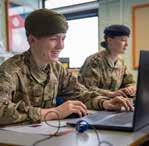






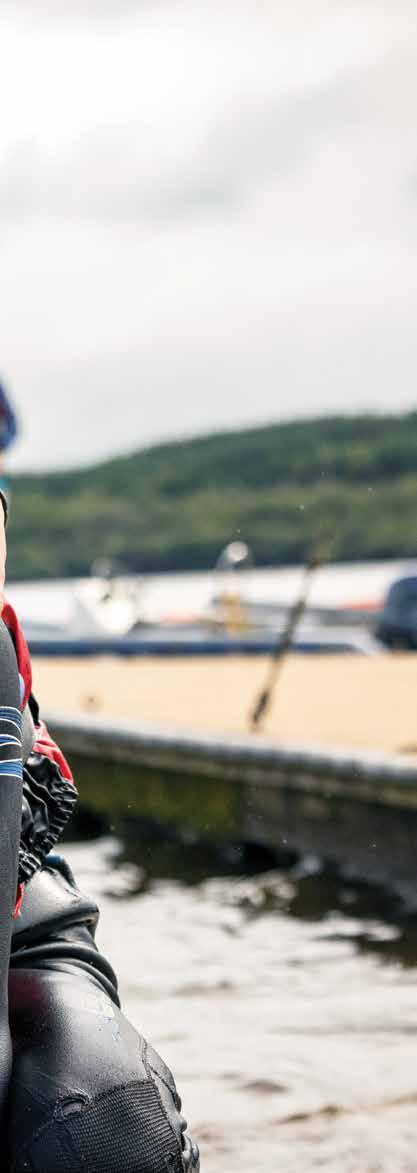


It’s been a superb 12 months for the Army Cadets, with our young people seizing opportunities to throw themselves into new activities, travel the globe for adventurous training and cultural enrichment, and find ever more enterprising ways to raise funds and be of service to their communities.
In this Year in Review, we’re delighted to throw the spotlight on academic research that reveals the amazing impact on social mobility (plus huge boost in wellbeing and career prospects) for young people who belong to the cadet forces. Discover how it’s particularly advantageous to those from poorer economic and disadvantaged backgrounds in our feature.
A huge number of cadets and adult volunteers have completed first aid qualifications in the past 12 months, and I could not be more proud of those who have heroically put their skills to use in real-life emergencies. Read about a few of these selfless acts in the following pages.
‘Set up cadets for life while also creating memories that will last a lifetime’
Finally, our gallery of summer camp pictures showcases the variety of activities that cadets engage in – from fieldcraft and drill to motocross and windsurfing. The resilience, leadership, planning and communication skills that these instil set up cadets for life while also creating memories that will last a lifetime.


From music and sport to adventurous training and 'the green stuff', our organisation is diverse in every respect.
14 Cadets history
Take a walk through the history of the Army Cadets and discover some key milestones on our journey.
18 2024 highlights
The Army Cadets took part in some exceptional events this year.
Find
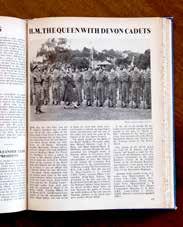

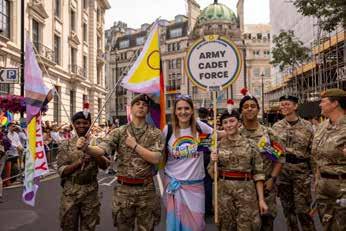
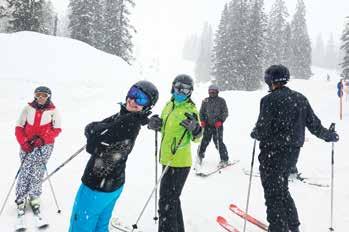



A four-year university study in 2020 revealed the positive impact on social mobility, wellbeing and career prospects for young people in the cadet forces.
How cadets and adult volunteers support their communities – from fundraising to remembrance parades.

Discover how individual cadets and adult volunteers saved lives in 2024.
Ever wondered what goes on at Army Cadets summer camps? We've got the whole story – in pictures.
Key honours, awards and qualifications gained.
We're a youth organisation that helps young people grow to be the best they can be through fun, friendship, action and adventure. In this way we help young people from every walk of life unlock their talents and shape their own future.
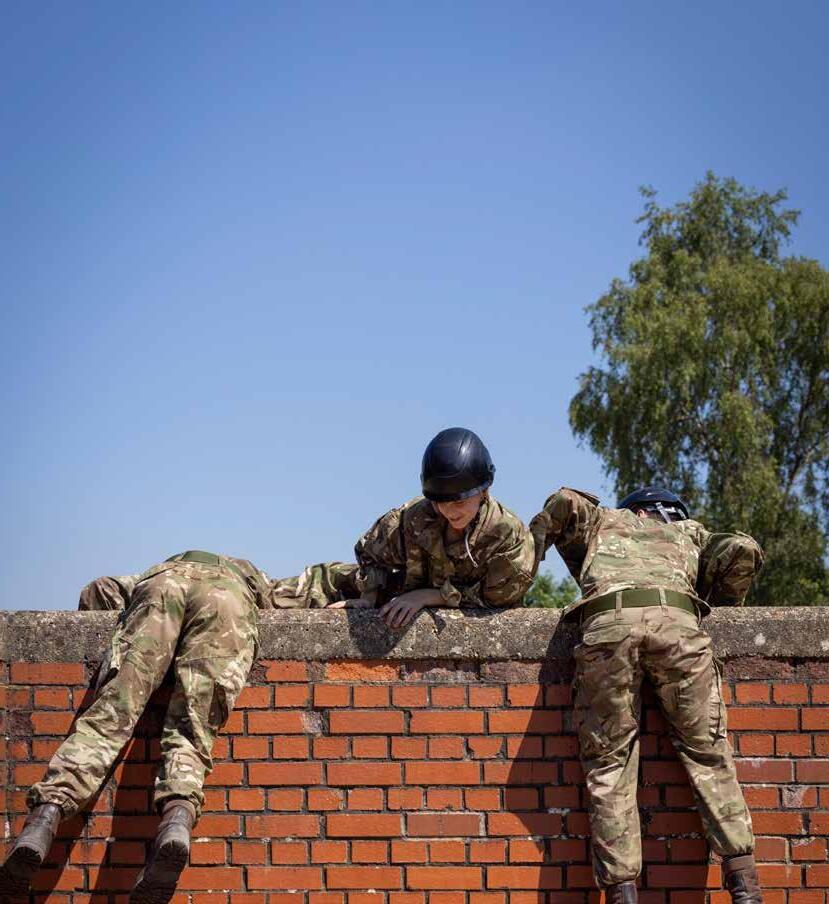


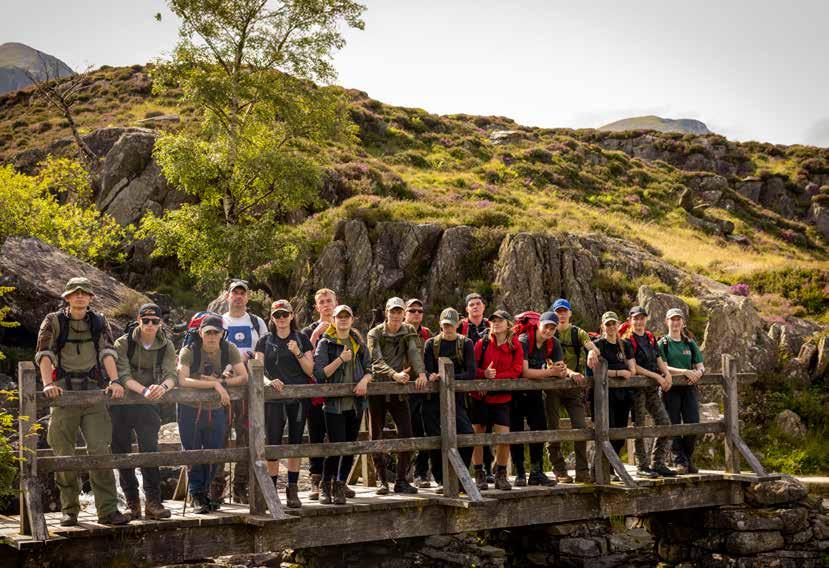
The Army Cadets is one of the UK’s biggest youth organisations and the largest of the MOD-sponsored youth cadet organisations.
We provide unparalleled opportunities and unique experiences via a team of dedicated adult volunteers and permanent staff, with support from key partners.
The Army Cadets is a combination of the Army Cadet Force (ACF) and the Combined Cadet Force (CCF). The ACF has over 1,600 units across the UK and Crown Dependencies, as well as a unit in Cyprus, and is open to any child aged 12-17 years. There are no specific school requirements to join.
The Combined Cadet Force (CCF) is found within schools and is for the pupils of that school. There are CCFs in over 464 schools across the UK.
We're fortunate to have some inspiring individuals playing key roles in our organisation, including our National Ambassadors Jordan Wylie MBE and Sally Orange MBE, and National Honorary Colonel Lorraine Kelly CBE.



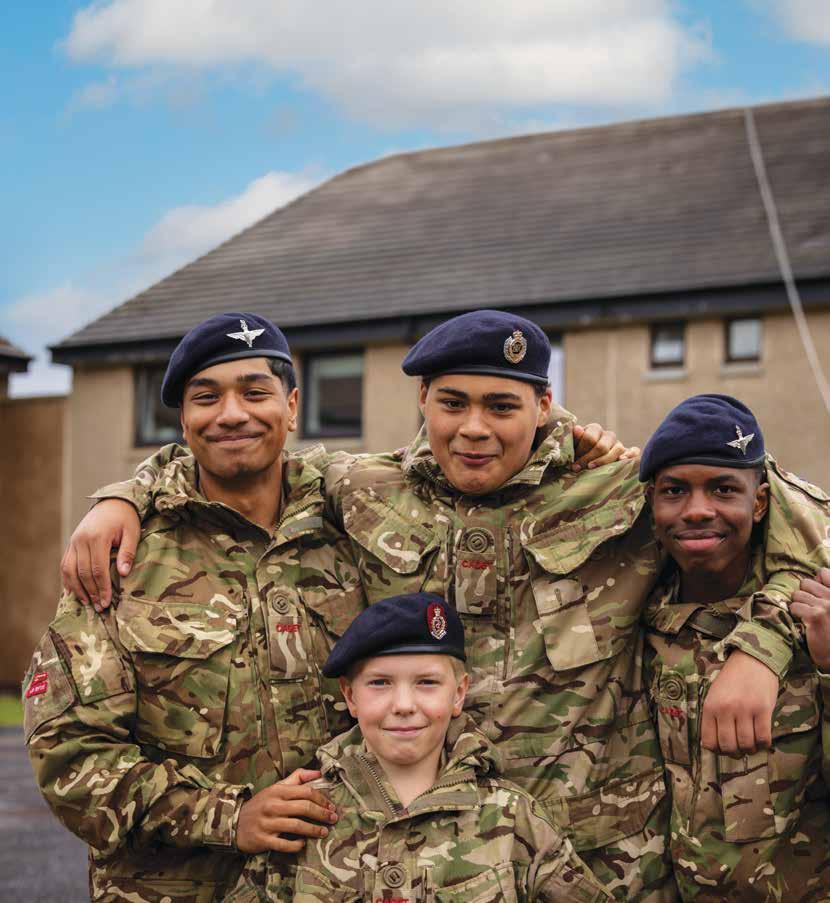
Our aim is to inspire young people to achieve success in life with a spirit of service to the King, their country and their local community, and to help them become good citizens.
Providing progressive cadet training, often of a challenging and exciting nature, to foster confidence, self-reliance, initiative, loyalty and a sense of service to other people.
Encouraging the development of personal skills, of practical leadership and the ability to work successfully as a member of a team.
Stimulating an interest in the Army and its achievements, skills and values.
Advising and supporting those considering a career in the services or the reserve forces.
Courage is both physical and moral. Physical courage is what enables us to motivate ourselves and others when the activity or the environment is hard or demanding, such as hiking across Dartmoor as part of a Ten Tors team.
Moral courage is having the strength and confidence to do what is right even when it might make us unpopular, such as standing up to bullying. It is also the courage to insist on maintaining the highest standards of behaviour. Both physical and moral courage are equally important, and showing courage in all forms earns respect and fosters trust.
Discipline helps us all to work effectively as part of a team. It isn’t just about being told off for doing something wrong; it’s about having the self-control to not do the wrong thing and the self-confidence and courage to stand up to those who do.
Self-discipline includes the ability to make the time to polish our boots, iron our uniform and be smart on parade, no matter what other distractions are around us.
Discipline helps build our team so everyone is trusted to do the task well. Good discipline means we all do the right thing – even when it's difficult.
Loyalty is what keeps teams together. In the Army Cadets that team could be our detachment, county, section, contingent or any other team we are part of, such as an expedition group, overseas exchange or sports team.
When we work together in a team we achieve so much more. However, loyalty must only support positive behaviours and actions. Loyalty to a team should never allow poor behaviours or the wrong thing to be done. Letting others stray from our values is not loyal to the team.
Respect for others means we treat them as we’d like to be treated.
The Army Cadets is a very varied and mixed team, and we must not discriminate against anyone because of their gender or because they have a different ethnic background, religion or sexual orientation from us.
We recognise the value everyone brings to the team and that they all have different viewpoints and ways to contribute. We must be kind and respect everyone, as teams that embrace everyone's uniqueness are stronger.
Integrity refers to honesty and showing strong moral and ethical principles in line with the Army Cadets values and standards.
When we show integrity we build trust in ourselves and in our team, and this makes the team stronger and able to do more.
Showing integrity also helps others outside the Army Cadets to trust us and helps us to do more in our communities. It's important that everyone, from the newest cadet to senior officers, demonstrates integrity in everything they do, otherwise trust will be eroded.
Selfless commitment is critical to good leadership and teamwork. It is about putting the needs of others ahead of our own to help everyone succeed.
We demonstrate this when we help someone with a lesson they are finding difficult, rather than going off for a break, or when we hang back with someone who is struggling on an expedition, rather than speeding on ahead. Without selfless commitment we can’t be good leaders. Remember the motto of Royal Military Academy Sandhurst, where Army officers are trained, is ‘Serve to Lead’.
We offer cadets the opportunity to challenge their limits and grow by being involved in a wide range of activities. We also give adult volunteers the chance to develop valuable skills.

Here are just some of the activities cadets can take part in and benefit from:
ADVENTUROUS TRAINING
EXPEDITIONS
MILITARY THEMED TRAINING
LIFE-SAVING SKILLS (FIRST AID)
TARGET SHOOTING
INTERNATIONAL EXCHANGES
THE DUKE OF EDINBURGH’S AWARD
FIELDCRAFT
PROFESSIONAL AND
PERSONAL QUALIFICATIONS

MILITARY MUSIC
PIPES AND DRUMS
COMMUNITY ENGAGEMENT
EXPEDITIONS
CYBER
TRIPS AND TRAINING
WEEKENDS AND CAMPS
STEM OPPORTUNITIES
LEADERSHIP TRAINING
We provide opportunities to play international sports against other nations while representing the UK's Army Cadets.
County, regional and national competitions are held in a variety of sports including:
ATHLETICS
CROSS COUNTRY
ARCHERY
FOOTBALL
RUGBY
HOCKEY
ORIENTEERING



• Being sponsored by the Army means we have access to equipment, locations and training that enhances the Army Cadets experience.
• Through military-themed activity such as drill and turnout, fieldcraft, military knowledge, shooting and weapon handling, we instil maturity, discipline and problem solving to shape future leaders.
• We push boundaries and inspire our cadets and adult volunteers to achieve things they never thought possible, while instilling core values and standards.
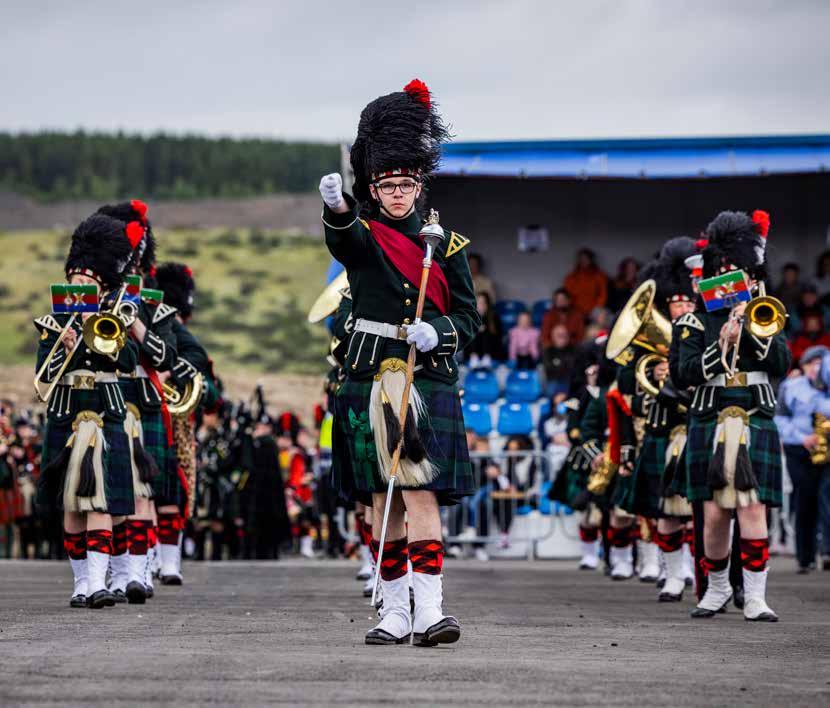
• Free music tuition is offered across the country, providing a range of opportunities, from Military Bands, Corps of Drums and Bugles, and Pipes and Drums.
• There are opportunities to play at prestigious locations such as Edinburgh Castle, Holyrood Palace, Disneyland and Gibraltar.
• Cadets can achieve recognised qualifications including BTEC First Diploma in Music (equivalent to a GCSE), Associated Board of the Royal Schools of Music (ABRSM) qualifications and SQA piping and drumming awards.




There are many adventurous training opportunities available for cadets and adult volunteers. Some provide the chance for international travel, such as ski trips in Norway and Bavaria.
We run two adventurous training centres in the UK: one in Capel Curig in Wales and another in Halton in Lancashire. Each runs a variety of training courses including:
MOUNTAIN LEADERS
HILL AND MOORLAND
LEADERS
PADDLE SPORTS
SAILING
KAYAKING
OPEN-TOPPED CANOEING
ROCK CLIMBING
SEA KAYAKING
KIT MAINTENANCE
ABSEILING
CAVING
NAVIGATION
Take a walk through the history of our organisation and some of the key milestones on the Army Cadets journey.
1859
Forerunners of cadet forces in schools first appeared when a number of schools formed units for the defence of the UK in response to the threat of invasion by France. The threat receded but units remained and, over time, more schools formed units which evolved into the Junior Officers’ Training Corps, administered by the War Office.
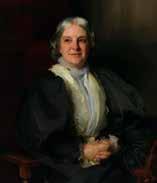
Social activist Octavia Hill established one of the first independent cadet units in Southwark, London. Other social reformers helped establish more of the independent cadet groups – separate from the corps attached to public schools and universities. They saw it as a way of rescuing working boys from poor living conditions.
1897
A selection of cadets were positioned on The Mall for Queen Victoria's Diamond Jubilee celebrations.
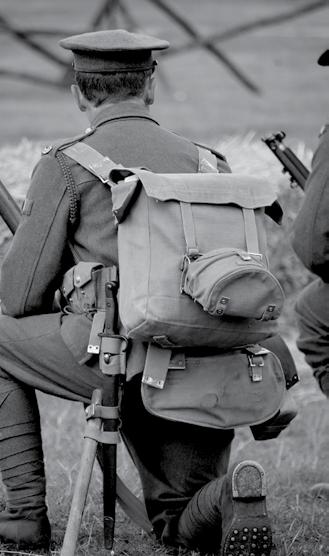

1914
The outbreak of the First World War saw a period of expansion for the Cadet Force. Cadets were trained to meet the demands on the home front.

1908
Secretary of State for War Richard Burton Haldane joined the Volunteer Force with the Yeomanry to form the Territorial Force. The newly formed Territorial Force absorbed the cadets into its organisation.
1910
The shortened term Cadet Force began to be used.
1930
After the First World War, the government ceased funding the Cadet Force and many branches closed. However, Field Marshal Lord Allenby and others campaigned for financial and organisational support and the British National Cadet Association (BNCA) was formed.
1939-1945
During the Second World War, cadets worked with the Home Guard and Reserve units acting as temporary instructors and supporting manoeuvres and drills. The War Office retook control of the funding and organisation of the Cadet Force, with the BNCA still in control of leisure activities such as sport and competition shooting, as well as the welfare of cadets.
1948
Cadet units in schools combined into one organisation named the Combined Cadet Force (CCF). Contingents had one or more service sections. There were 247 schools that joined and His Majesty King George VI became its Captain General (pictured right, inspecting the Signal Platoon of Portsmouth Grammar School CCF at Bourley Camp, Aldershot, in 1948).
1945
The BNCA was renamed the Army Cadet Force Association (ACFA).
1953
Her Majesty Queen Elizabeth II became the Captain General of the CCF, and HRH Prince Philip, Duke of Edinburgh, was made Colonel-in-Chief of the ACF.

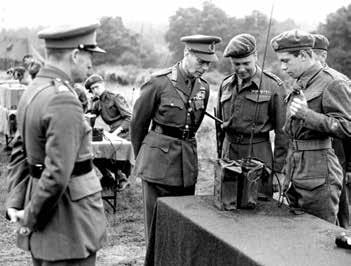
1952
The Combined Cadet Force Association (CCFA) was established to represent all the schools with CCF units.
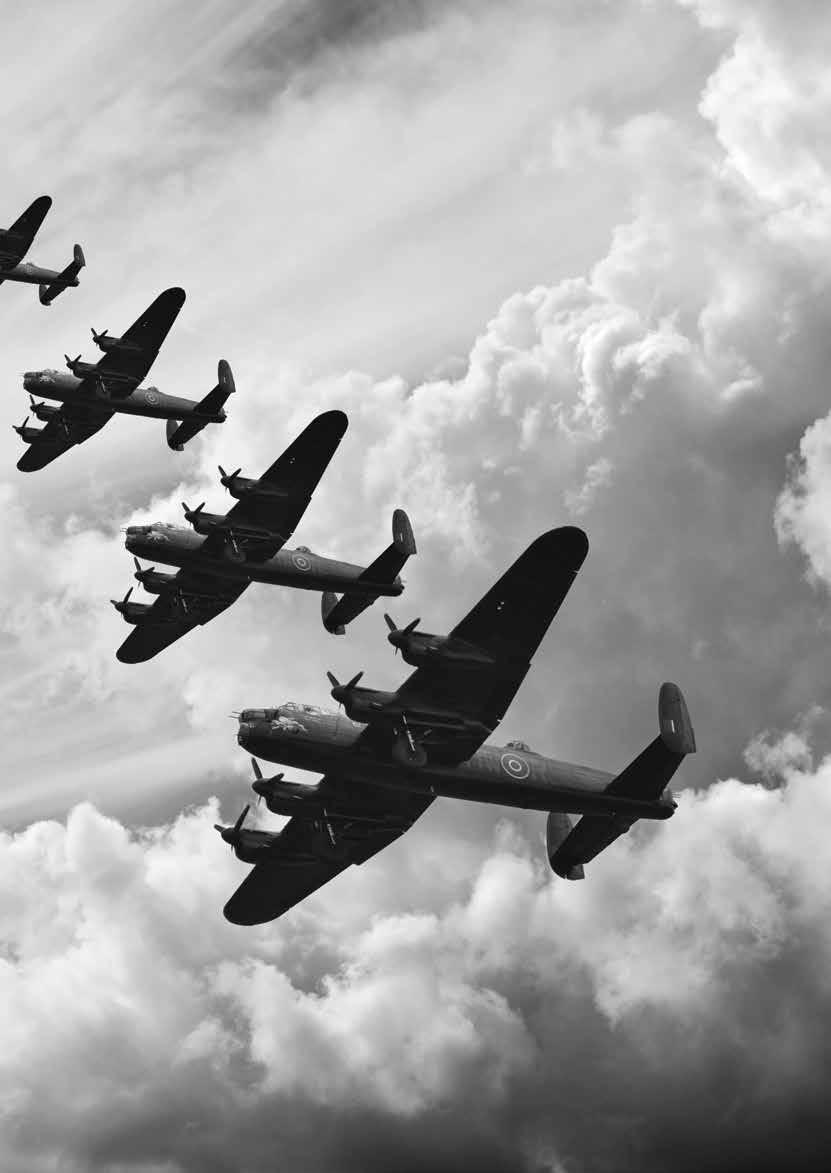
1956-57
Army cadets were among the first participants to take part in the pilot scheme for The Duke of Edinburgh's Award.
The national Cadet Training Centre, Frimley Park, opened in Surrey, increasing opportunities for cadets and adult volunteers. This is now known as the home of the Army Cadets.
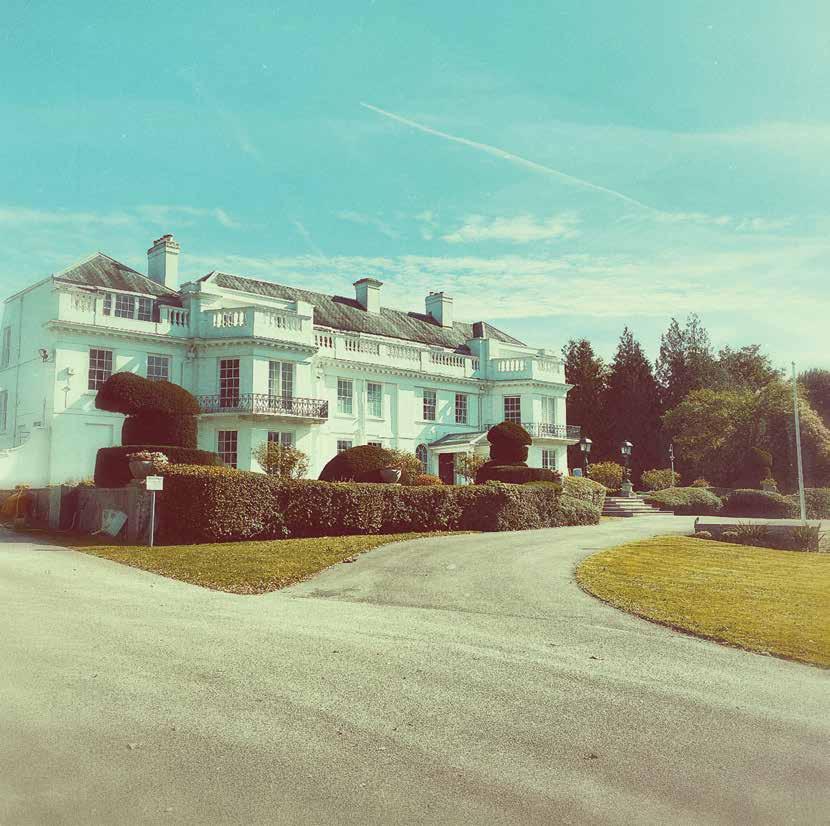
Cadets celebrated their centenary with a variety of activities including the Royal Parade of the Cadet Forces at Buckingham Palace on 22 July. The chief event was the presentation of the banner to the ACF by HRH The Duke of Edinburgh at a ceremony at the Tower of London. During the year, this banner was passed from unit to unit and county to county across the UK.
After several pilot schemes, girls joined the Army Cadet Force.
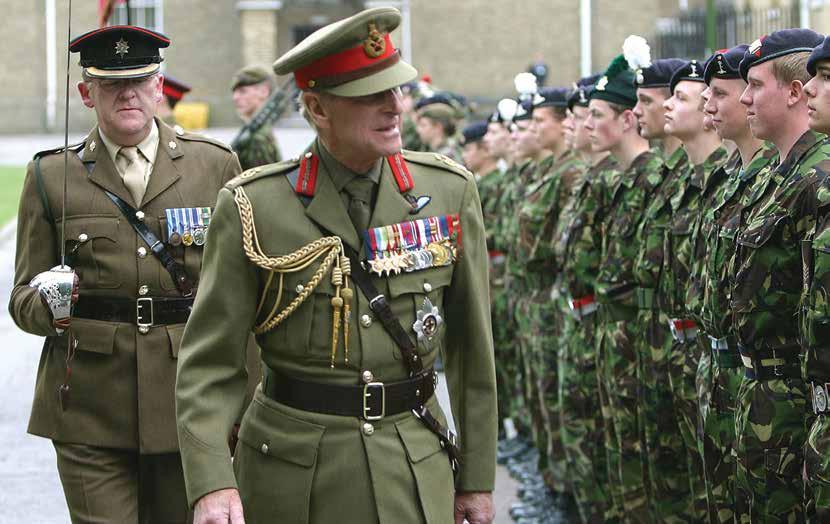
HRH The Duke of Edinburgh presented a personal banner to the ACF at Royal Military Academy Sandhurst. The banners he presented in 1960 and 1982 are laid up in St Peter’s Church, Frimley and the banner presented in 2005 is at CTC FrimleyPark.
HRH The Duke of Edinburgh’s last official engagement with the ACF as its Colonel-in-Chief was a visit to the Cadet Training Centre, Frimley Park on 17 October to mark the 50th anniversary of its foundation.
To celebrate their 150th anniversary, cadets and volunteers from all cadet forces marched down The Mall on 6 July for a Royal Review. The then Prince of Wales took the salute outside Clarence House, which was followed by a Royal Garden Party in Buckingham Palace.

The government launched the Cadet Expansion Programme (CEP) to strengthen cadet forces in schools. The aim was to form new cadet units in English state-funded secondary schools, focusing on schools in areas of high deprivation. It was a joint programme between the Ministry of Defence and the Department for Education.

Army Cadet Force Association was rebranded as ACCT UK. Their support continues to enable all young people to access the life-changing development programmes offered by the Army Cadets.
To remain contemporary, relevant and progressive, the Army Cadets syllabus (first introduced in 1976 and updated in 1990) was refreshed. This progressive syllabus includes testing in drill and turnout, military knowledge, skill at arms, navigation, fieldcraft, first aid, expedition training and shooting.

2024
Since the start of the CEP in 2012, a total of 362 schools have been approved to establish a cadet unit. This has completely changed the shape of the CCF: now contingents in state schools outnumber those in independent schools.
c

This year included many exciting events for the Army Cadets. We're delighted to share a few standout moments.

For the first time in the event's history, cadets were invited to take part in Trooping the Colour. The prestigious ceremony took place in London on 15 June to mark the official birthday of His Majesty King Charles III.
Attired in No 1 Dress, cadets were the first point of contact when guests arrived and they assisted spectators and escorted VIPs. Later in the day, alongside other youth organisations, they led 25,000 members of the public down The Mall from Admiralty Arch to Buckingham Palace for the monarch's appearance on the balcony.
In total, 16 cadets and 10 CFAVs took part in the King's Birthday Parade, and Capt James Douet CCF, Contingent Support Officer of the London District Cadet Training Team, was the officer in command of the Army Cadets contribution.
'To be trusted by the Army to be present at the biggest ceremonial event of the year was quite something, both as an individual and as an organisation,' said Capt Douet. 'We have proved we can deliver to the highest standard with coordination and hard work, and this raises the prestige of the Cadets in the eyes of both the public and the Army.'
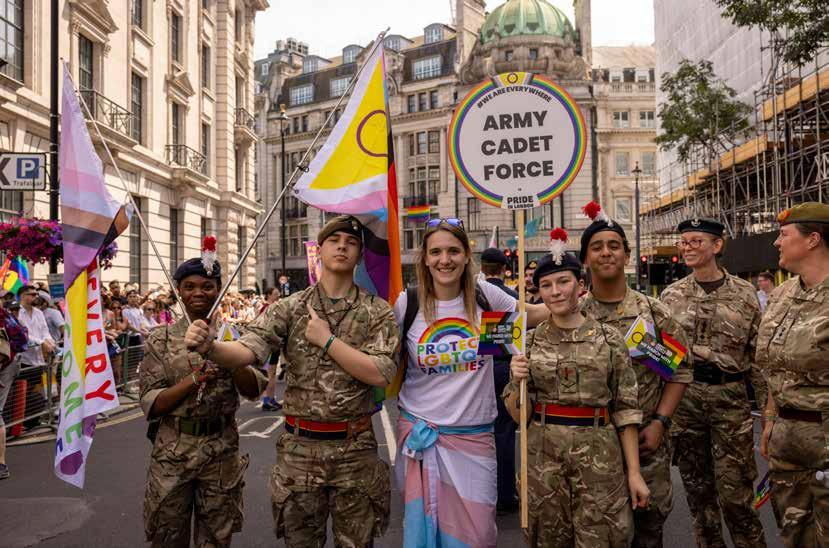


The rainbow flag was flown with pride when cadets from London and the South took part in Pride 2024, joining over 32,000 participants from LGBT+ community groups, businesses and partners.
Organised by the Army Cadets LGBT+ Forum, the contingent included adult volunteers and cadets from South West London Sector and ACFs from Wiltshire, Surrey and Essex. Together they formed part of the youth section, marching through London behind the Armed Forces contingents, past Buckingham Palace and The Cenotaph.
Rachel Diss, HQ Cadet Branch Diversity & Inclusion Lead, said: 'It’s really important for cadets to feel accepted and that they can be themselves among their friends. To get on with the training, they must be given the opportunity to function at their best and that comes with being their authentic selves.
'Pride in London 2024 was more than just a parade; it was a powerful demonstration of unity and a heartfelt celebration of the values that bind us all together.'
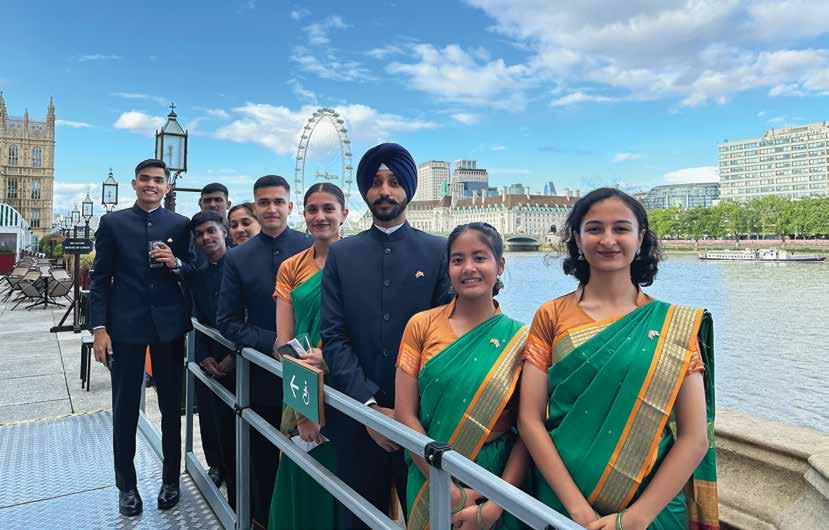
Army Cadets gave a warm welcome to cadets from across the world in a three-week International Exchange Camp in July. Young people from Canada, India, Poland, Latvia, Lithuania and Estonia were given a flavour of the Army Cadets way of life in the UK.
The camp, which included trips to see iconic British landmarks and the opportunity to take part in adrenaline-fuelled outdoor pursuits, was the first single event of its kind to involve multiple countries.
In the first week, the international cadets – along with some UK cadets – were given a whistle-stop tour of some of the UK's landmarks including the Tower of London and Windsor Castle. They then spent a few days at the Cadet Training Centre at Frimley Park in Surrey and took part in activities such as archery, laser clay shooting and STEM projects. They also had a visit to the prestigious Royal Military Academy Sandhurst.
The week culminated with the honour of dinner at the House of Lords. Gifts were exchanged in a ceremony led by Colonel Catherine Jardine, former Assistant Chief of Staff, Cadets Branch, in a goodwill gesture symbolising a spirit of camaraderie and mutual respect.
Addressing the gathering, Brigadier Anthony Lamb, Head of Cadets, emphasised the importance of such events in fostering global friendships and understanding. 'This is the first time we've brought together so many representatives, and I hope it won't be the last,' he said.
The cadets then visited Scotland for a military phase before finishing the journey with some adventure training in either the Lancashire or Welsh Cadet Adventure Training Centre.
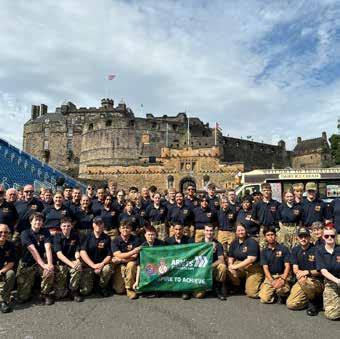
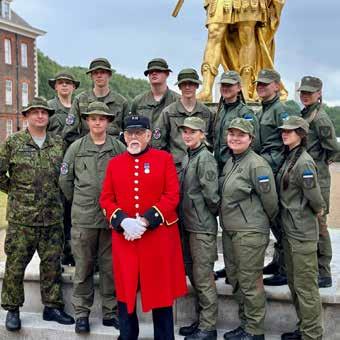

Talented musical cadets had the honour of being invited to perform at a Military Musical Spectacular, presented by the Household Division of the Army.
The showcase, over three nights in July, was a magnificent celebration of military music, pageantry and precision, and the cadets were delighted to be involved.
Senior Drum Major Jack Gibson of Cleveland ACF said: ‘Taking part was a once-in-a-lifetime opportunity. It gave us, as young cadets, the chance to prove that we have what it takes to perform in events like this alongside the Army.’
Set against the historic backdrop of Horse Guards Parade in St James’s Park, London, the event showcased the finest elements of British military tradition and was a breathtaking fusion of sound and colour, featuring the Massed Bands of the Household Division, Massed Pipes and Drums, and the Mounted State Trumpeters.

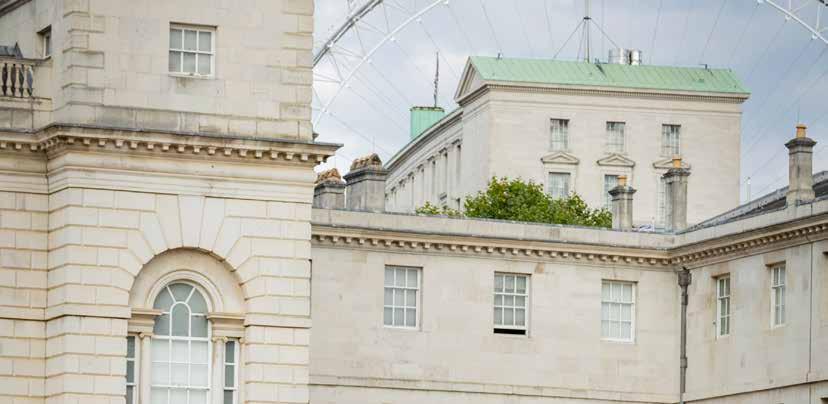
From international exchanges to battlefield tours and adventurous training trips, cadets travelled widely in 2024. Here are a few places they visited.
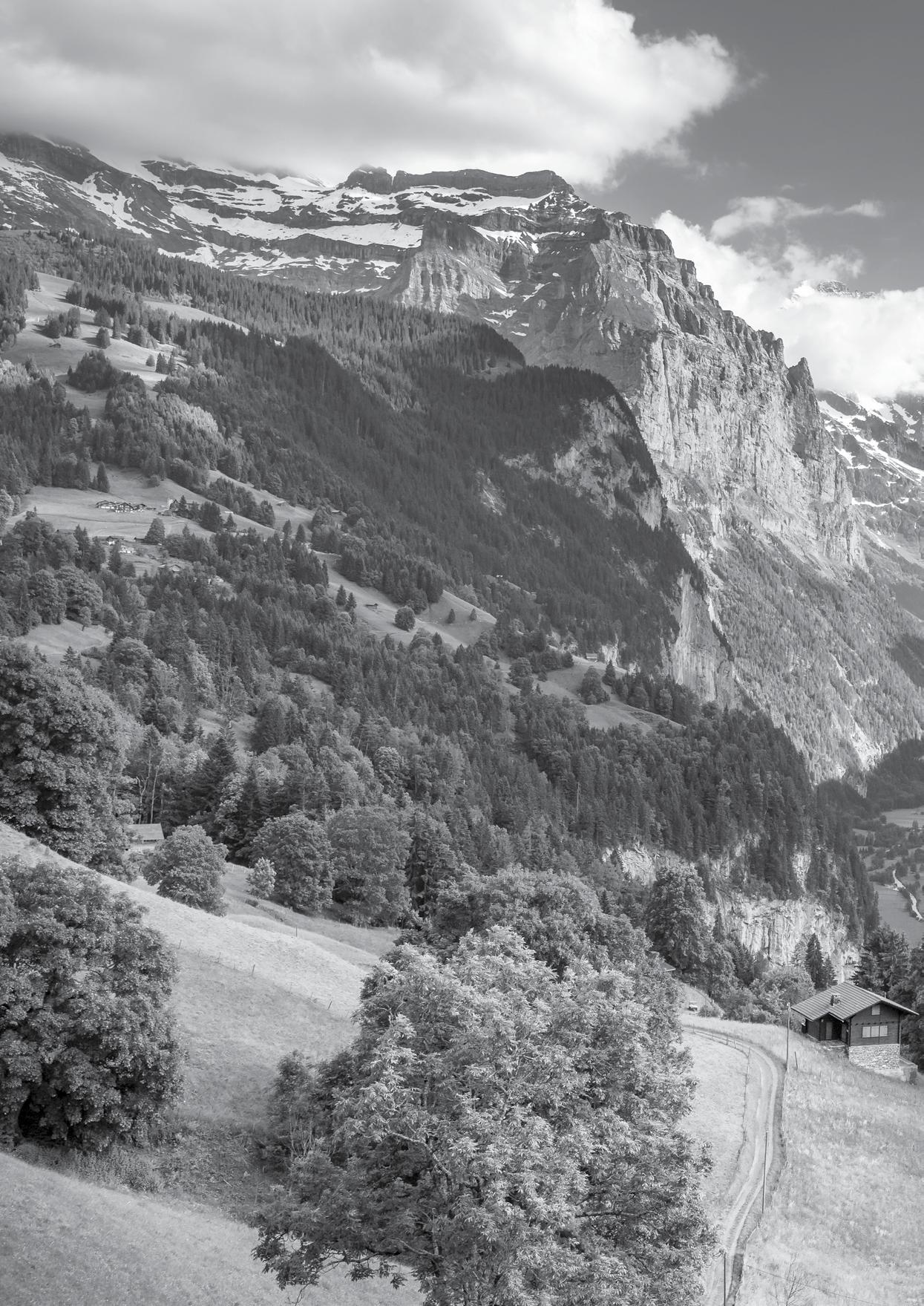



20 countries and counting!
CHECK-CIRCLE GERMANY
CHECK-CIRCLE NETHERLANDS
CHECK-CIRCLE ITALY
CHECK-CIRCLE FRANCE
CHECK-CIRCLE MALTA
CHECK-CIRCLE NORWAY
CHECK-CIRCLE GIBRALTAR
CHECK-CIRCLE CYPRUS
CHECK-CIRCLE BELGIUM
CHECK-CIRCLE SPAIN
CHECK-CIRCLE AUSTRIA
CHECK-CIRCLE SWITZERLAND
CHECK-CIRCLE CANADA
CHECK-CIRCLE USA
CHECK-CIRCLE ANTIGUA
CHECK-CIRCLE INDIA
CHECK-CIRCLE KENYA
CHECK-CIRCLE SOUTH AFRICA
CHECK-CIRCLE AUSTRALIA
CHECK-CIRCLE NEW ZEALAND
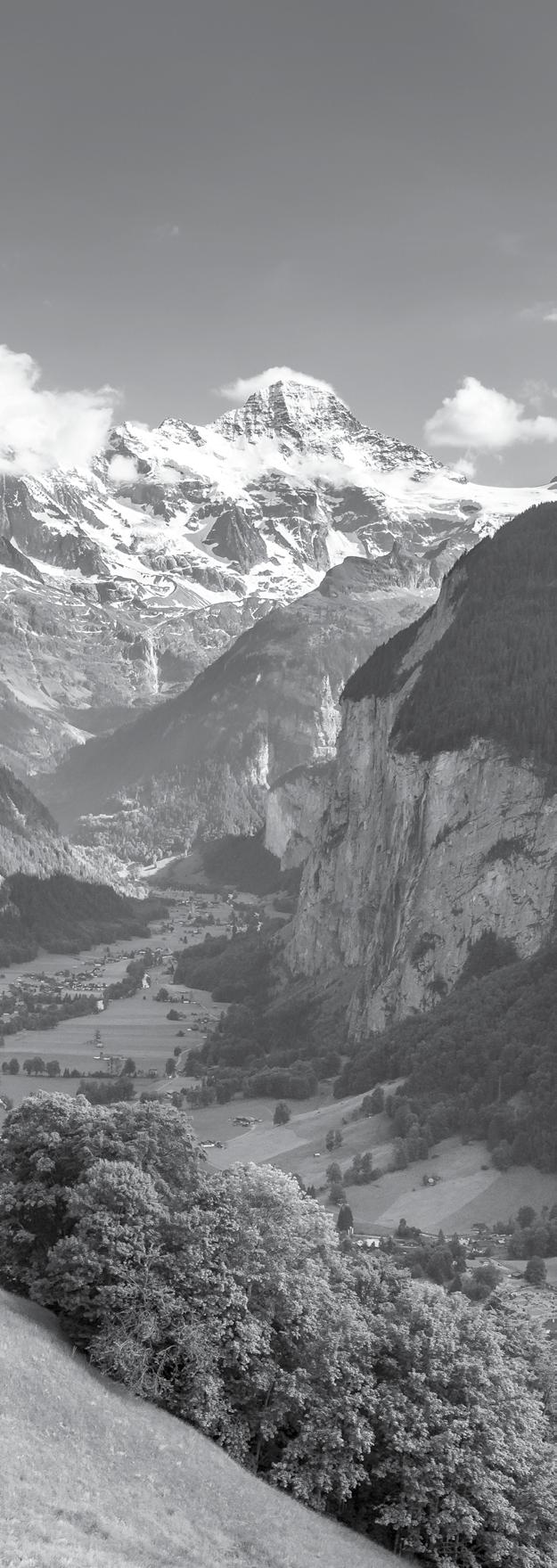
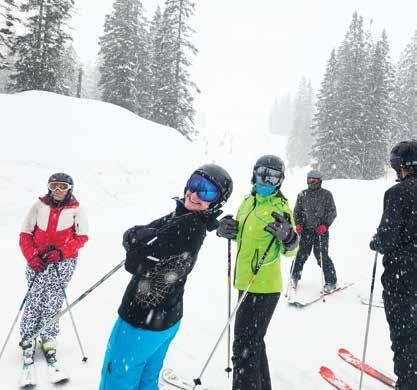
Fifty eight ACF and CCF cadets from across the UK took part in a life-changing ski trip to Sonthofen in Bavaria, Germany.
Two groups of cadets were deployed to the Alps for five days of ski training. They gleaned tips from experts and pushed themselves physically and mentally to master the fundamentals of the sport. The adrenaline-packed adventure was an opportunity for personal development and the chance to learn to ski. Cadets achieved qualifications and certificates.
‘So far in my cadet career, this is by far the best thing I’ve ever done’
Cdt
Cpl Abigail Bone, Glasgow and Lanarkshire Bn ACF
Cadets from Hereford & Worcester ACF took part in a ski trip to the Pyrenees.
Ex VENTURE SNOW CUB was attended by 43 cadets under guided ski instruction from civilian company Inspireski. Overcoming fear of falling and heights, they navigated the mountains, showing remarkable personal growth and resilience. Their experience was enriched by the cultural exchange between Spanish and English peers and by trying the local cuisine.

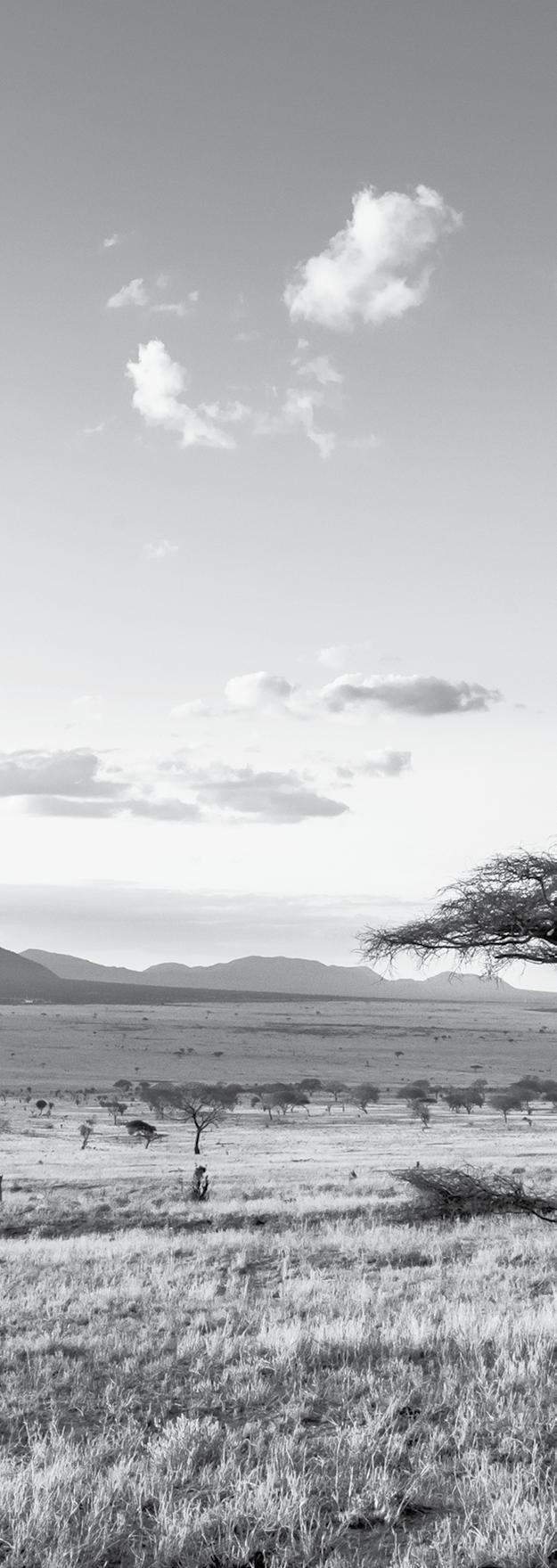

A group of 32 cadets and 13 adults from Warwickshire and West Midlands (South Sector) ACF undertook a two-week community engagement tour of South Africa.
Cadets slept in bush camps, encountered wildlife, visited orphanages and schools, and did a three-day safari and four-day educational battlefield tour of Isandlwana and Rorke’s Drift.
‘They will continue to reap the benefits of this expedition for many years to come’
Capt
Dan Priddy of Dyfed & Glamorgan
ACF
Ex KWAZULU NATAL Y DDRAIG was an expedition to South Africa undertaken by 72 cadets and 15 adult volunteers from the three Welsh ACF Counties.
The trip included a giraffe field study, a 20km rafting journey and an 80km selfsufficient trek through landscape marked by Anglo-Zulu and Boer War remnants. The group took a three-day battlefield tour at Elandsheim Retreat and finished the expedition at Somkhanda Community Game Reserve where cadets engaged in safaris, foot treks, anti-poaching efforts and community engagement.
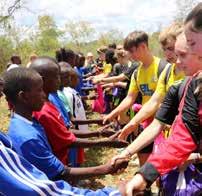
A team of 20 cadets travelled to Sagana in Kenya where they worked at Thangathi Primary School carrying out repairs and teaching maths, English and science.
Cadets helped set up a Kenyan Football Academy and managed a tournament. They beat home players 5-5 (3-2 on penalties) but softened the blow by donating a full strip of football kit to every child, along with other clothing, shoes and toys.
The trip ended with a two-day safari during which cadets camped outdoors.

This year's instalment of a long-running exchange trip between British Army Cadets and India’s National Cadet Corps (NCC) saw ten Army cadets befriend cadets from around the world during a three-day odyssey of northern India’s tourist spots, which included the Taj Mahal, the Red Fort and the Amber Palace.
In Delhi, they visited the National War Memorial at India Gate and enjoyed a VIP presence at the Republic Day parade. They demonstrated their marching skills in the presence of Indian Prime Minister Shri Narendra Modi.
The cadets also had the honour of attending a formal dinner with India's Minister of Defence Raksha Mantri Shri Rajnath Singh, tea in the gardens of the residence of the prime minister, and an audience with Indian President Smt. Droupadi Murmu.

ANZUK together at RNZN Museum Auckland

‘We performed an ‘eyes right’ and salute to Indian Premier Narendra Modi’
Staff Cdt RSM Ehsan Iqbal
‘The exercise has been one of the best things I've done, not only in the Army Cadets, but in my life’
Cdt Sgt Ellis-Phillips of 19 Company
Ex ANZUK – a 14-day exercise in New Zealand and Australia – was a life-changing experience for 20 cadets and six adult volunteers from Middlesex and North West London ACF. They were joined by 21 cadets from New Zealand and Australia during the trip. The cadets visited Auckland, Wellington, Sydney and Canberra where they explored museums, war memorials and military sites.
‘The annual tour is a way to honour the sacrifices and ensure the bravery of those who fought is never forgotten’
Maj Mark Hames ACF
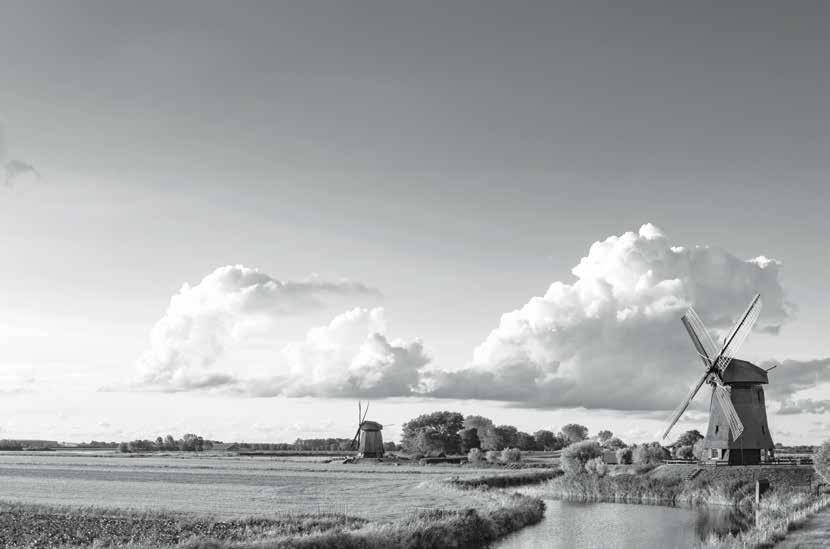
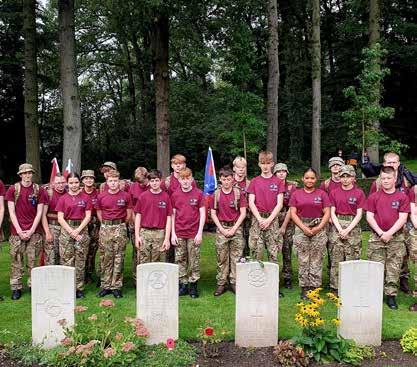
The battlefields of the First and Second World Wars and the world’s largest single-day marching event were on the itinerary for Ex SHAMROCK PEGASUS. The four-day study trip in Belgium and the Netherlands was attended by 25 cadets and seven adult volunteers from Ballygowan Detachment, F Company, 2nd (NI) Battalion ACF.

Cadets from Oxfordshire ACF travelled to Normandy for an eight-day battlefield tour. It was the 25th time a group had undertaken this trip. This year was particularly special as it was the 80th anniversary of D-Day, and cadets and CFAVs were following in the footsteps of their predecessor regiment, the Oxfordshire & Buckinghamshire Light Infantry.
The cadets visited 20 sites, museums and memorials, and participated in 11 commemoration events where they laid wreaths in remembrance.
‘The trip challenged me to make new friends and face my fears ... it turned me into a more confident person’
Cdt Joseph Baker, Glasgow & Lanarkshire ACF
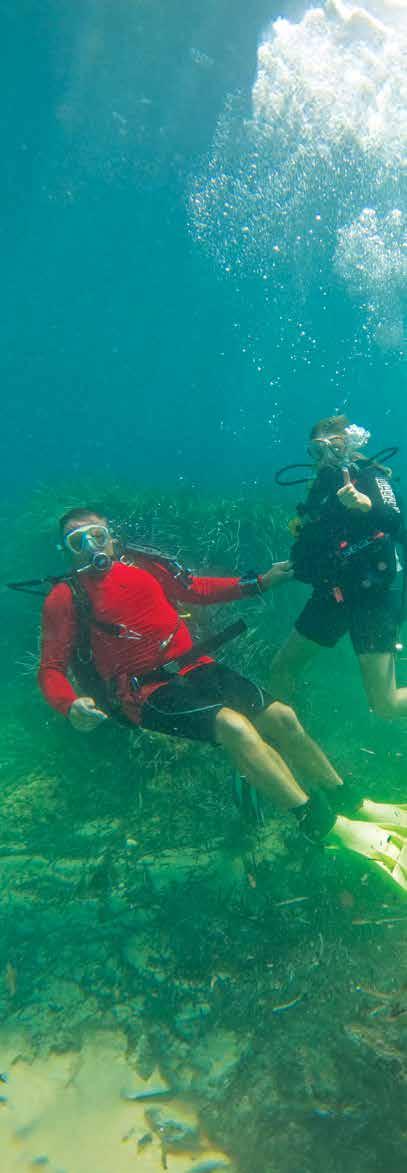
A group of 19 cadets from Glasgow & Lanarkshire ACF had an adventurous training trip to Malta in the summer. They learnt how to scuba dive at beautiful locations across the island, gained their PADI qualifications, and explored the culture and history of the island.
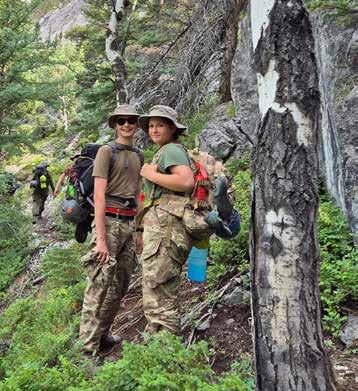
‘The cadets were put through their paces in the remote wilderness’
Lead
Escort Officer Maj Andy Emery of Wiltshire ACF
The month-long Ex OAKLEAF 2024 Canadian exchange programme saw 20 cadets aged 15 to 17 from across the UK fly to Calgary to take part in the Expedition Team Leader course at the Rocky Mountain Cadet Training Centre in Alberta.
During their stay they embarked upon an extensive 12-day expedition designed to reinforce their physical and mental resilience, enhance problem-solving abilities and foster a strong sense of community and service. Activities included cable traversing, hiking, biking, rock climbing and camping.
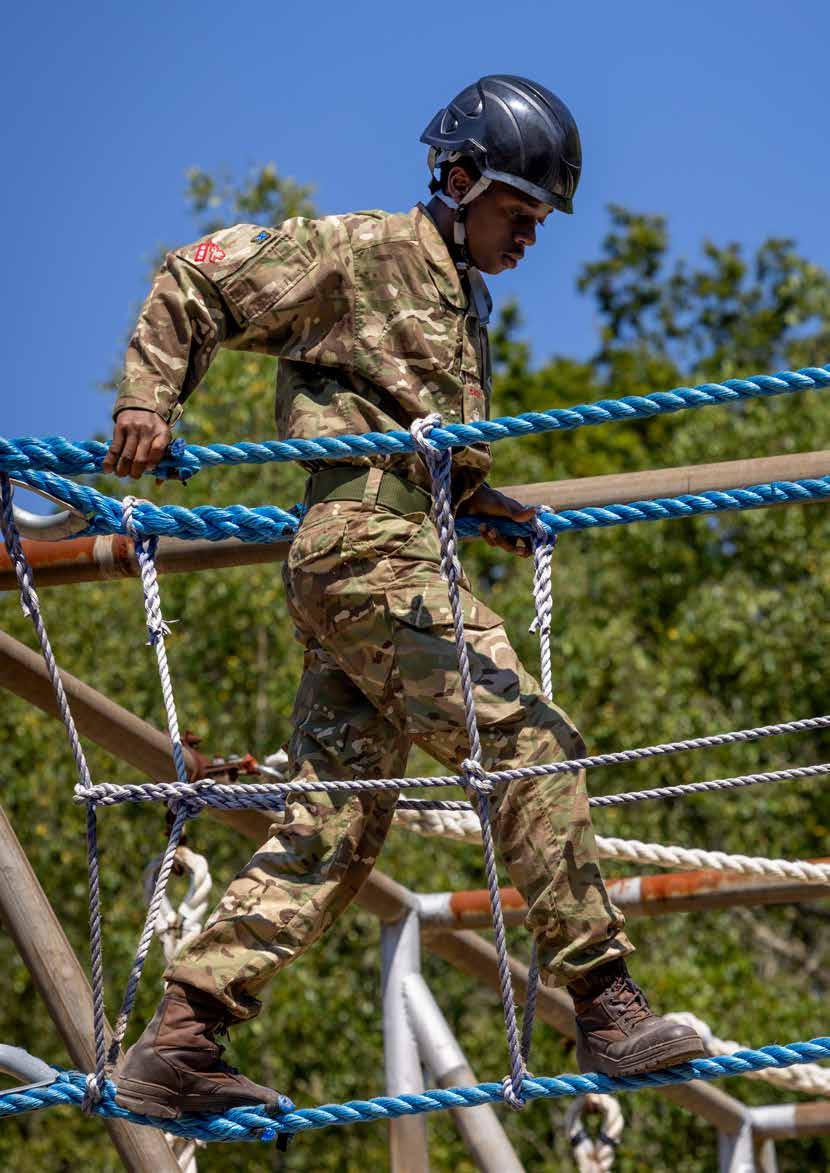
A four-year university study revealed the amazing impact on social mobility, plus a huge boost in wellbeing, career prospects and social mobility for young people who belong to the cadet forces.

Being a member of the cadet forces has a significant positive impact on young people and improves their employment, career prospects and social mobility, according to independent research.
The study, What is the social impact and return on investment resulting from expenditure on the Cadet Forces in the UK?, was carried out by the University of Northampton between 2016 and 2020.
The report, on behalf of the Ministry of Defence (MOD) and the Cadet Vocational College, was commissioned by the Combined Cadet Force Association. It found that being a member of the cadet forces particularly impacted the prospects of cadets who suffered economic and other disadvantages.
It also noted that belonging to a cadet force improved mental and physical wellbeing and could result in fewer visits to the GP or less use of mental health support services.
Professor Simon Denny, Institute for Social Innovation and Impact at the University of Northampton, said: ‘Our research has concluded that the cadet forces provide structured challenge, discipline, training, education and, importantly, fun.
'Cadets and their adult volunteer instructors gain new skills and qualifications which increase their education and employment opportunities.’
One key finding of the research was that participation in the cadet forces had particularly significant positive impacts on young people, particularly those suffering economic and other disadvantages.
The findings related to the concept of self-efficacy, associated with improved motivation and performance at school (see Table 1 on page 33). The report noted that even moderate improvements in GCSE attainment could lead to significant increases in economic benefits to society.
The research team commended the important work being carried out by adult volunteers to help children from economically disadvantaged backgrounds attain the same levels of self-efficacy as their more affluent peers – which also benefits the UK taxpayer.
As a result of developing and deploying key attributes, young people experience a number of positive outcomes, including:
+ Improved social mobility
+ More effective education (a direct consequence of improved attendance and behaviour)
+ Improved mental and physical wellbeing
+ Enhanced employability
+ Reduced vulnerability/increased resilience
Calculations using 2019 figures indicate that young people in cadet forces produce a return on investment of around £95m per annum (pa), comprising:
£ Reduction in GP visits (approx .value £502,000 pa)
£ Reduction in use of mental health services (approx. value £681,000 pa)
£ Lifetime private benefits from their increased likelihood of attending further education (FE) or higher education (HE) of around £70,300,000
£ Lifetime public benefits in increased tax receipts from their increased likelihood of attending FE/HE of around £23,400,000

The report also noted that being able to study for and gain vocational awards through the Cadet Vocational College (CVC) and the Scottish Qualifications Authority (SQA) was an integral part of the cadet-force experience. CVC and SQA provide vocational qualifications to members of uniformed UK youth groups and their adult-volunteer instructors.
The vocational qualifications offered provide formal and accredited recognition of skills such as teamwork, leadership, management and self-reliance – all competences employers say they look for in staff.
In addition, the report mentioned the CyberFirst programme, which was launched in September 2018 by the Secretary of State for Defence. It aims to equip up to 2,000 cadets a year with the skills and expertise to help them become future leaders in the emerging cybersecurity sector.
The programme gives cadets the opportunity to learn how to protect systems connected to the internet from cyber attacks. The initiative, the first of its kind in a NATO state, recognises the role the cadet forces play in developing employable young people by equipping them with new and sought-after skills.

The report found that cadet forces develop a number of attributes in young people who have been cadets for at least 12 months.
The ability to communicate clearly, to diverse audiences, through formal and informal presentations and in discussions and interviews.
The ability to lead a group of people to achieve an objective. This skill includes the ability to plan and to communicate that plan, as well as being able to control, motivate and drive a team to succeed.
The ability to keep going, even when things go wrong or the situation is challenging.
The ability to work as a member of a team, sharing views and helping others, while being able to take instructions and orders from the team leader.
Using social skills, including different behaviours, to achieve positive outcomes.
The understanding that people are not the same, and the ability to accept diversity and work with the different talents that people have.
The personal confidence to utilise key skills in different situations and with different people.
‘Expenditure on the cadet forces is an excellent way to support community cohesion and inclusion’
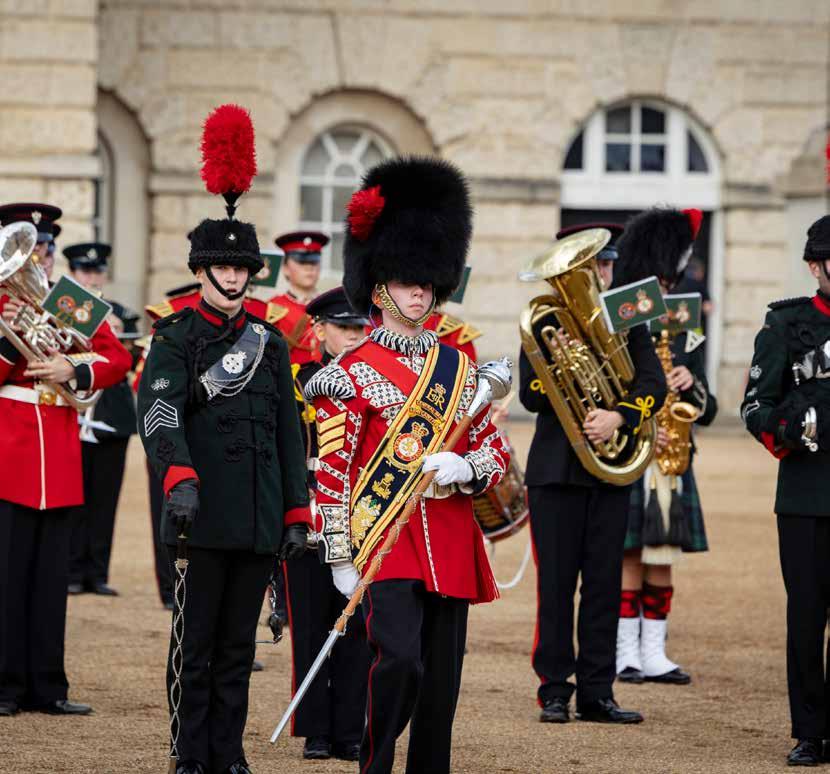
The report also found participation in the cadet forces improves the health and wellbeing of cadets which, alongside a higher probability of attending higher or further education, can result in an annual return on investment of around £95m. In addition, it found that expenditure on the cadet forces is an excellent way to support community cohesion and inclusion.
Overall, the report outlined a significant return on investment in the cadet forces, with the cadet experience offering potentially life-changing opportunities for career progression and vocational qualifications. It also increased career prospects for those who may not hold traditional educational qualifications.
'The positive impacts on social mobility are, frankly, amazing,' said Professor Denny. 'The cadet forces represent a very good use of taxpayers' money.'
Table 1: Differences between people with strong or weak senses of self-efficacy
People with a strong sense of self-efficacy
People with a weak sense of self-efficacy

• Qualifications
• Teamwork, leadership, mentoring
• Increased opportunities at work
• Better mental wellbeing
• Enjoyment and fulfilment
• Support to the community
• View challenging problems as tasks to be mastered
• Develop a deeper interest in the activities in which they participate
• Form a stronger sense of commitment to their interests and activities
• Recover quickly from setbacks and disappointments
• Avoid challenging tasks
• Believe that difficult tasks and situations are beyond their capabilities
• Focus on personal failings and negative outcomes
• Quickly lose confidence in personal abilities
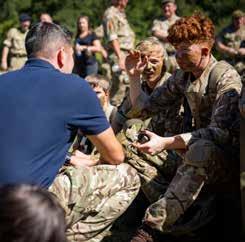
• Increased school attendance
• Reduction in number of GP visits
• Reduction in use of mental health services
• Increased likelihood of attending FE/HE
• Increased potential lifetime earnings
• Increased tax receipts
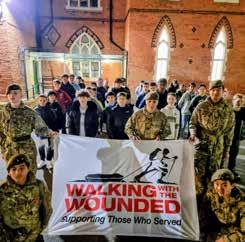
• Located in every UK constituency
• CFAVs/cadets are in education, employment or are employers and are in the community wearing uniform

Cadets and adult volunteers support their communities in a range of ways –from fundraising to remembrance parades.
Leicestershire, Northamptonshire and Rutland ACF (LNR ACF) made a significant mark at two remembrance events in 2023.
They took part in the parade at the annual National Service of Remembrance at The Cenotaph, Whitehall, paying tribute to the servicemen and women who made the ultimate sacrifice. The cadets prepared rigorously for the high-profile event, to ensure they carried out their responsibilities with precision. The event was attended by members of the Royal Family, government officials and thousands of spectators.
LNR ACF also proudly represented the Army Cadets at the Royal British Legion’s Festival of Remembrance at the Royal Albert Hall on Saturday 11 November.
The occasion commemorated the sacrifices of all military personnel who served the UK and Commonwealth. It featured performances by renowned musicians and choirs, along with symbolic acts of remembrance.
A highlight of LNR ACF’s participation in both events was the appointment of Cdt RSM Thomas Dyer as the ACF Banner bearer.
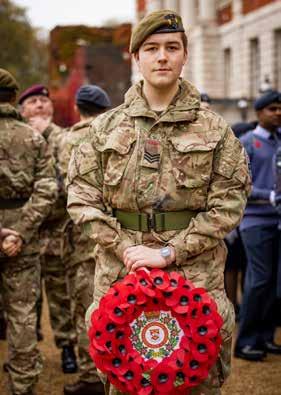
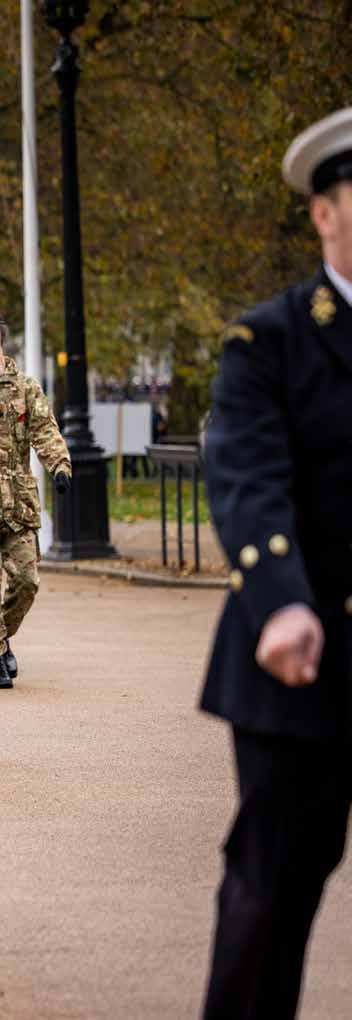

SSI Donna Hawley of Yorkshire (North & West) ACF with her award for Excellence in Community Service
SSI Donna Hawley of Yorkshire (North and West) ACF was honoured with the prestigious British Citizen Award (BCA) at the Palace of Westminster in July. The accolade was awarded for services to volunteering and charitable giving.
Over 21 years, Donna has raised funds for ACCT UK (Army Cadet Charitable Trust) and multiple other charities. She has carried out many physically demanding endeavours to raise the money, including skydiving, the Tough Mudder UK challenge and endurance bike rides. In 2023 she completed a gruelling 100-mile London bike ride and, this August, took part in a 300-mile London to Amsterdam ride.
Donna also gained recognition at the annual ACCT UK Excellence Awards at Carpenters’ Hall, London, this year, where she was honoured with a Community Service Award (pictured).
Donna is a keen supporter of ACCT UK in her fundraising efforts, helping the charity carry out its mission to ensure cadets experience adventurous training activities and learn skills for life through The Duke of Edinburgh’s Award, first aid, music, sport and community service.
Walking With The Wounded (WWTW) is always an extremely popular choice for cadets and their units when it comes to choosing a charity to raise funds for. WWTW is close to cadets’ hearts as it supports ex-service personnel and their families.
This year was no exception and, over two days in June, Cdt Cpl Bobbi Sancha, 16, from Hove, raised almost £1,500 by completing the Three Peaks Challenge, scaling Ben Nevis, Scafell Pike and Yr Wyddfa (Snowdon). 'It felt amazing reaching the summits knowing that my efforts were helping such an important charity,' said Bobbi.
'It’s fantastic to have such incredible support from the younger generations,' said WWTW events manager James Davis. 'The dedication and enthusiasm of cadets not only helps raise essential funds but also fosters a sense of intergenerational community and solidarity.'
At Christmas, WWTW’s biggest annual fundraising event takes place: Walking Home for Christmas (now rebranded as Walking Home), which sees volunteers walk to raise money for the charity.
Last year, cadets and CFAVs from 13 Company SW London ACF raised £2,794 by trekking 18 miles from Putney to the Royal Hospital Chelsea, passing 10 London bridges to mark the event’s 10th anniversary. Team members donned Santa hats and carried a Christmas tree, which they delivered to the hospital.
The cadets were very motivated by the cause they were supporting. Cdt Cpl Katie Cheetham of 137 Detachment Putney Grenadier Guards added: ‘I wanted to support the families and veterans and to give back to a great charity.’
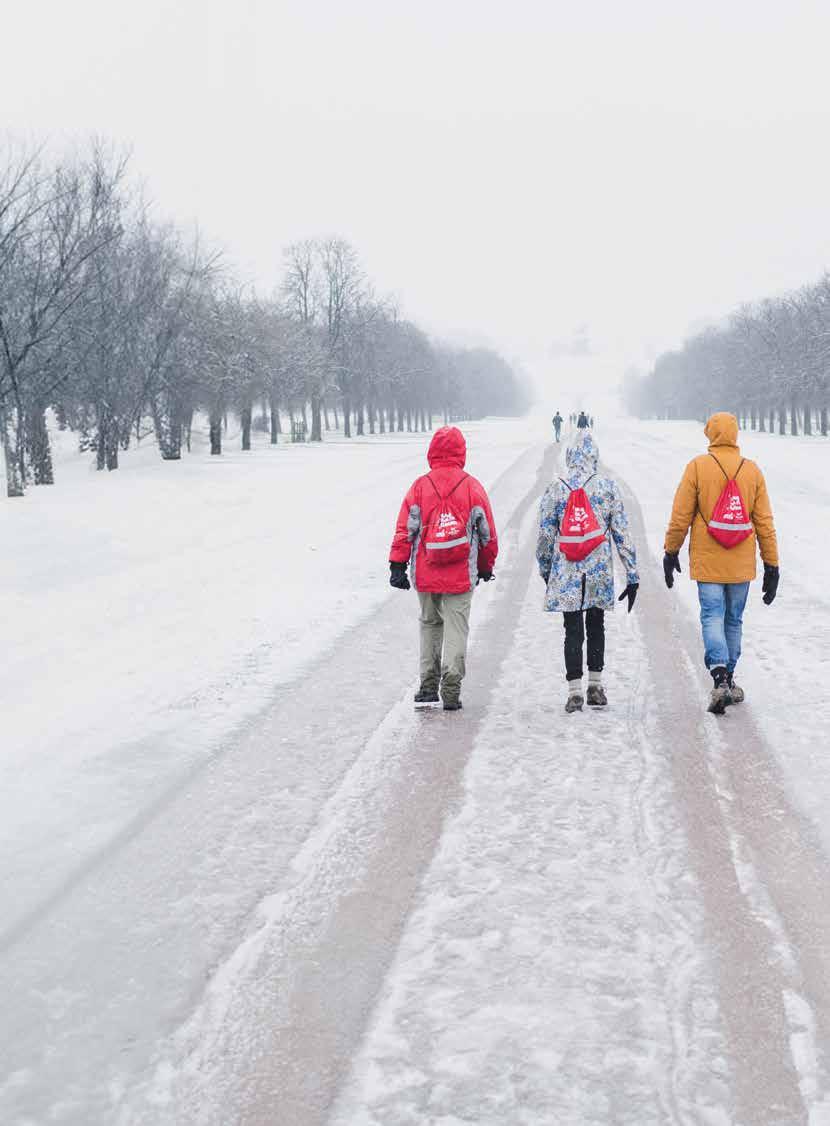
‘The dedication and enthusiasm of cadets not only helps raise essential funds but also fosters a sense of intergenerational community and solidarity’

Maj Kaz Lorimer (Officer Commanding, 13 Company, SW London ACF) said cadets often give the following reasons for turning out in the cold to walk long distances: ‘It’s about giving support and raising money for a charity that helps those who have given their time and more; wanting to be challenged and to be part of a community; and because it is the right thing to do.’

SSI Lewis Wilde was inspired to raise cash for WWTW by his voluntary work with veteran social groups. With SSI Matt Marquis, he led a plucky team of CFAVs from Yorkshire (North and West ) ACF on a 30km walk from Galtres Training Area in Strensall to Malton Detachment last December.
Conditions were difficult and it snowed. When the team completed their journey, they found an email from WWTW telling them exactly how the £1,500 they’d raised would be spent. SSI Wilde said: ‘It made us quite emotional – and because we were a bit short of the amount required, we shook the tin some more.’
One grateful veteran, who has seen the benefit of such fundraising efforts, said: ‘I was struggling to support my family and working extra shifts to make ends meet. WWTW was phenomenal. My care coordinator came to my house and asked: “What can we do to help you today?”. We talked, and she found the funds to get us through.’

A pilot scheme that saw Humberside and South Yorkshire (HSY) ACF working with the Victoria Cross Trust (VCT) to document war graves within the county footprint has paved the way for other young people to carry out war-grave maintenance.
The pilot scheme was the first time the Commonwealth War Graves Commission (CWGC) agreed to work with young people under 18 years old. The scheme proved so successful that the CWGC has now changed its policy to allow youth groups to become Eyes On, Hands On volunteers and help ensure war graves are well tended.
During the pilot scheme, adult volunteers and 22 cadets from C Company, along with a contingent from the Royal Air Force Air Cadets, met VCT representatives at Adwick Cemetery near Doncaster. A second session took place at City Road Cemetery in Sheffield, which has over 200 military graves.
The cadets learnt how to record the headstones and their condition, and plot their location using a geolocation tool.
The information they gathered allowed the VCT to report back to the CWGC about the status and condition of the graves. Led by Deputy Lieutenant for South Yorkshire Adrian Hunt, the cadets then expanded the project in Adwick-le-Street Cemetery and began to research more about the history of the graves.
Head of engagement for HSY ACF, Maj John Lomas, said: ‘By engaging in such hands-on historical preservation, cadets are ensuring that the sacrifices of those who fought for their country are not forgotten.’
The success of this pioneering initiative has paved the way for other Army Cadet units to become Eyes On, Hands On volunteers and follow HSY ACF’s lead. The ACF currently looks after three cemeteries under the voluntary scheme, and other detachments across the UK are being encouraged to train as Eyes On, Hands On volunteers.
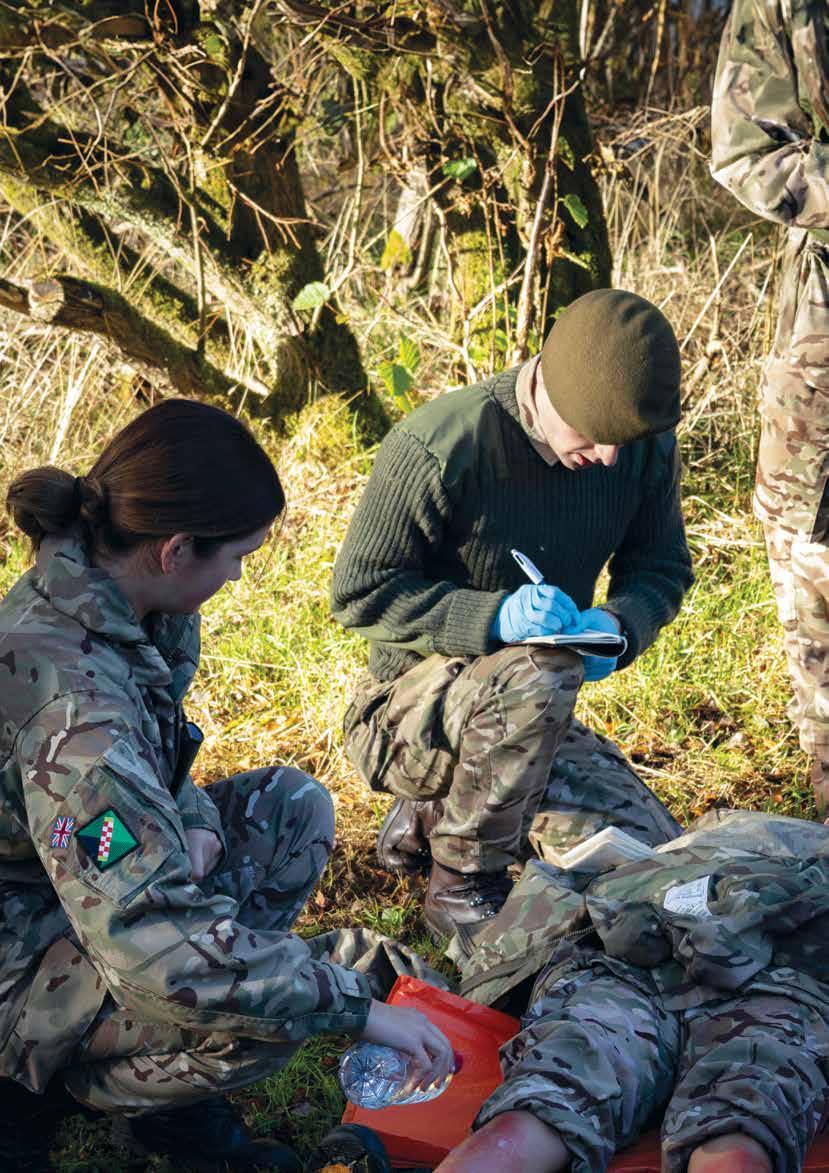
Cadets receive training in life-saving first aid skills which, sometimes, get put to the test in serious real-life situations ...
1
We showcase ten of the many cadets and adult volunteers who have applied first aid skills learnt in the Army Cadets to real-life situations and been recognised through award nominations.
Cdt Gerard Evans, aged 14, of Bedfordshire and Hertfordshire ACF witnessed a man being hit by a car. The casualty was thrown into the air and landed with his head on the kerb.
Gerard ascertained that the man was unconscious, with shallow breathing, and that blood was coming from his nose and the back of his head. With the help of a bystander, he carried out first aid and reassurance as the casualty regained consciousness, continuing until paramedics arrived.
Award: ACCT UK National Praiseworthy Action Award

3
Cdt Sgt Phoebe Clarke, aged 16, of Yorkshire (North and West) ACF heard a loud bang. When she investigated, she saw there had been a collision between two cars. One lady was bleeding very badly so Phoebe stemmed the blood, applied a dressing and looked after her until an ambulance arrived 20 minutes later.
Award: ACCT UK National Praiseworthy Action Award

2
Cdt LCpl Owen Jones, aged 14, of Gwent and Powys ACF was on a night out with his family when he saw a man collapse in cardiac arrest. Owen called for an AED (Automated External Defibrillator) and, with the help of his mother, carried out CPR (cardiopulmonary resuscitation). The casualty was taken to hospital and survived.
Award: Royal Humane Society Resuscitation Certificate
4
An incident at a McDonald’s restaurant was responded to with prompt action by Cdt LCpl Kenneth Barrett (aged 17), Cdt LCpl Arwin Bool (aged 17), Cdt LCpl Aleksandra Angom (aged 16) and Cdt LCpl Jessica King (aged 15) of Middlesex and North West London ACF.
The cadets were in the restaurant after an Army Cadets event when they noticed members of staff trying to deal with a customer who had vomited and was struggling to breathe.
The cadets took charge of the incident and helped to clear the vomit from the man’s airway before placing him in the recovery position. An ambulance was called and all necessary information was passed to the emergency services operator. When it arrived 20 minutes later, the cadets were able to hand over to the paramedics and state what they had seen and done.
Awards: ACCT UK National Praiseworthy Action Award

5
A man who had collapsed in a park was given first aid by Cdt Teanna Brown (aged 16), Cdt Luke Bowden (aged 14), Cdt Jessica Impey (aged 13) and Cdt Maddie James of Suffolk ACF. The four cadets helped the man to his feet but he refused emergency help. The cadets then assisted him to walk but he collapsed to the ground again. The cadets put him in the recovery position and reassured him that emergency help had been called. While waiting for an ambulance, they found out that his wife had passed away two weeks before. The ambulance arrived and took him to hospital.
Awards: ACCT UK National Praiseworthy Action Award
‘Mia ascertained that the unconscious woman wasn't breathing so she performed CPR on her, resulting in her colleague's heart restarting’
6
Cdt Sgt Mia Hamilton, aged 17, of Cambridgeshire ACF came to the aid of a work colleague who had suffered a collapse. Mia ascertained that the unconscious woman wasn’t breathing so she performed CPR on her, resulting in her colleague’s heart restarting. The woman went on to make a good recovery.
Award: Royal Humane Society Resuscitation Certificate
7
Cdt LCpl James Wing, aged 17, of Kent ACF was on a riverbank during a school trip when a teacher was hit violently by a speeding cyclist and knocked to the ground. James took control of the situation, assisted the remaining staff member, calmed his fellow students and reassured the injured teacher who was taken to hospital with neck and back injuries.
Award: ACCT UK National Praiseworthy Action Award

8Lt Thomas Jones of Cardiff and Vale College CCF offered his assistance to a first responder, aiding a non-breathing casualty who had been electrocuted. Avoiding the live cables, Lt Jones started chest compressions, allowing the responder to insert an airway and connect an AED. Once paramedics arrived, the casualty’s breathing was restored.
Awards: Royal Humane Society
Testimonial on Vellum; Royal Humane Society Resuscitation Certificate
Lt Col Miranda Mills of Bedfordshire and Hertfordshire ACF saw a woman lying face down on grass, ignored by passersby. She placed the woman in the recovery position and got a bystander to call 999. During the 30-minute wait for the ambulance, Lt Col Mills cleared the woman’s airway several times, while a member of staff from a nearby pharmacy administered oxygen.
Award: ACCT UK National Praiseworthy Action Award

10
Cdt Cpl Logan Beckett, aged 16, of 1st (Northern Ireland) Battalion ACF helped an elderly veteran who had fallen on a cold night. Taking control of the situation, Logan requested that his friends get blankets and a hot water bottle from neighbours.
Logan ensured the veteran was kept warm and called 999 and the man’s family. When paramedics arrived the cadet briefed them. They commended Logan for his actions and told the man’s family that his quick reaction had prevented further injuries and possibly saved his life.
Award: ACCT UK National Praiseworthy Action Award
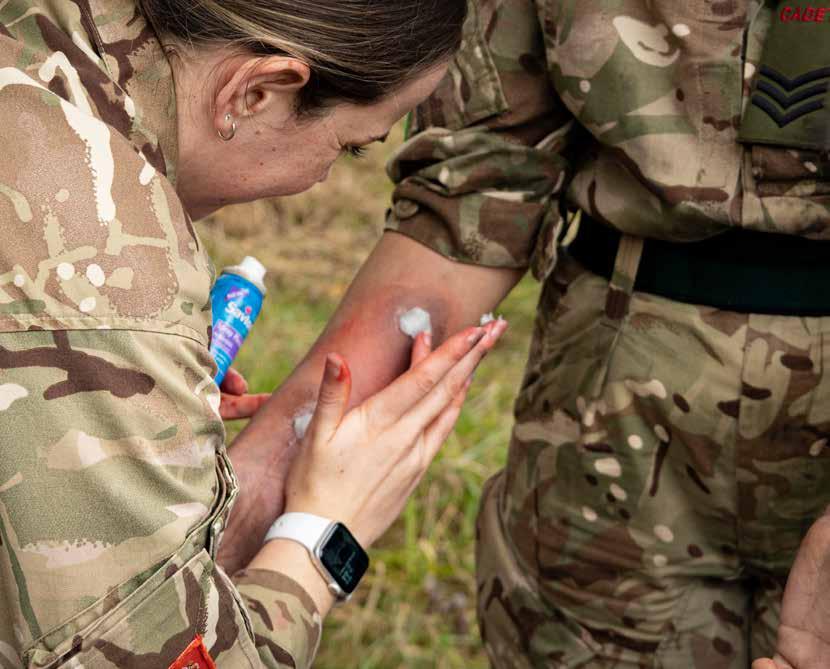
October 2023 to October 2024.
9,629
905
437
Adults
1,279
220
48
26

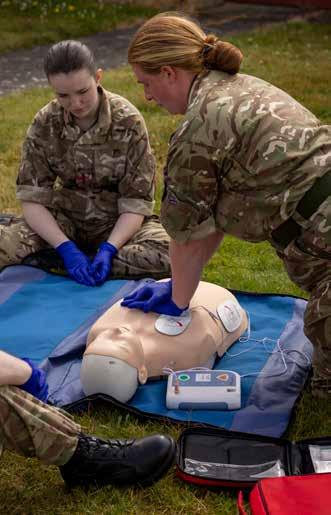
Each year, cadets and adult volunteers from across the UK take part in the National and Inter-Services First Aid competitions.
In November 2023, they were hosted at the Greater Manchester Fire and Rescue Safety Centre, taking advantage of its exceptional facilities to create even more realistic first aid scenarios. With an impressive line up of participants from across the UK, the event showcased the remarkable skills of cadets and young adults from various services.
A total of 17 ACF and CCF teams from around the country, along with two guest teams (the Volunteer Police Cadet Corps and Birchwood Air Cadets) and six Sea Cadet Corps units, gathered for an action-packed weekend of first aid challenges.
The judging panel consisted of a mix of external adult volunteers and service helpers from the 206 (North West) Multi-Role Medical Regiment, ensuring fair and rigorous evaluation.
As teams awaited their turn to showcase their abilities, the event featured an enlightening presentation by the Army Medical Services Engagement Team. Cadets also had the unique opportunity to meet Millie, an Arms Explosive Search Military Working Dog, and gain insights into the role these animals play in the British Army.
Durham ACF secured the top spot in both the ACF Cadet and Young Adult categories. Dulwich College emerged as the victors in the CCF Young Adult Team, with Dollar Academy capturing first place in the CCF Cadet Competition. The City of London Volunteer Police Cadet Corps emerged victorious in the guest team competition, and South Central Sea Cadet Corps clinched the title in the Sea Cadet Corps category.
Sunday saw the winners from Saturday’s competitions battling it out for the coveted title of overall Inter-Service Champions. This saw each team and its members face an individual test and an overall team test. In the end, Durham ACF continued their remarkable performance, achieving not just the Cadet Team title but also the Young Adult Team accolade.

In 2024, approximately 25,500 cadets from across the UK spent time at summer camps, gaining a wide variety of new experiences. For some, it was their first time away from home, while for others it was their first time spent outside a city environment.
Summer camp is about making new friends, being challenged by trying new things and having fun while learning in the care of adult volunteers.
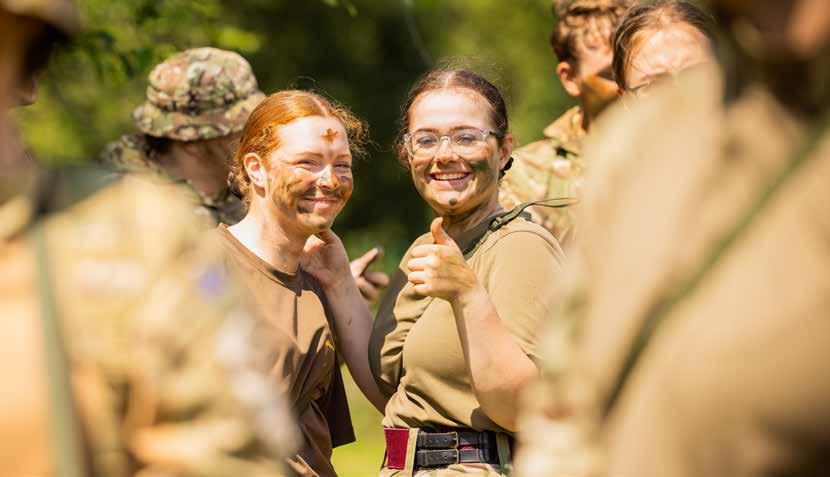

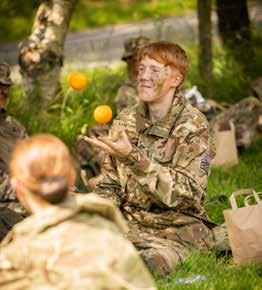




‘Throughout the camp I got better at learning new things and working towards a goal – and at making myself heard.
‘I was a bit worried initially because it was my first ever summer camp but, as I started learning more, I met new people who were willing to help me at every step.
‘I would recommend annual camp because it provides new experiences and you get a feeling of achievement. It may seem challenging, but once you start you won’t want to stop.’

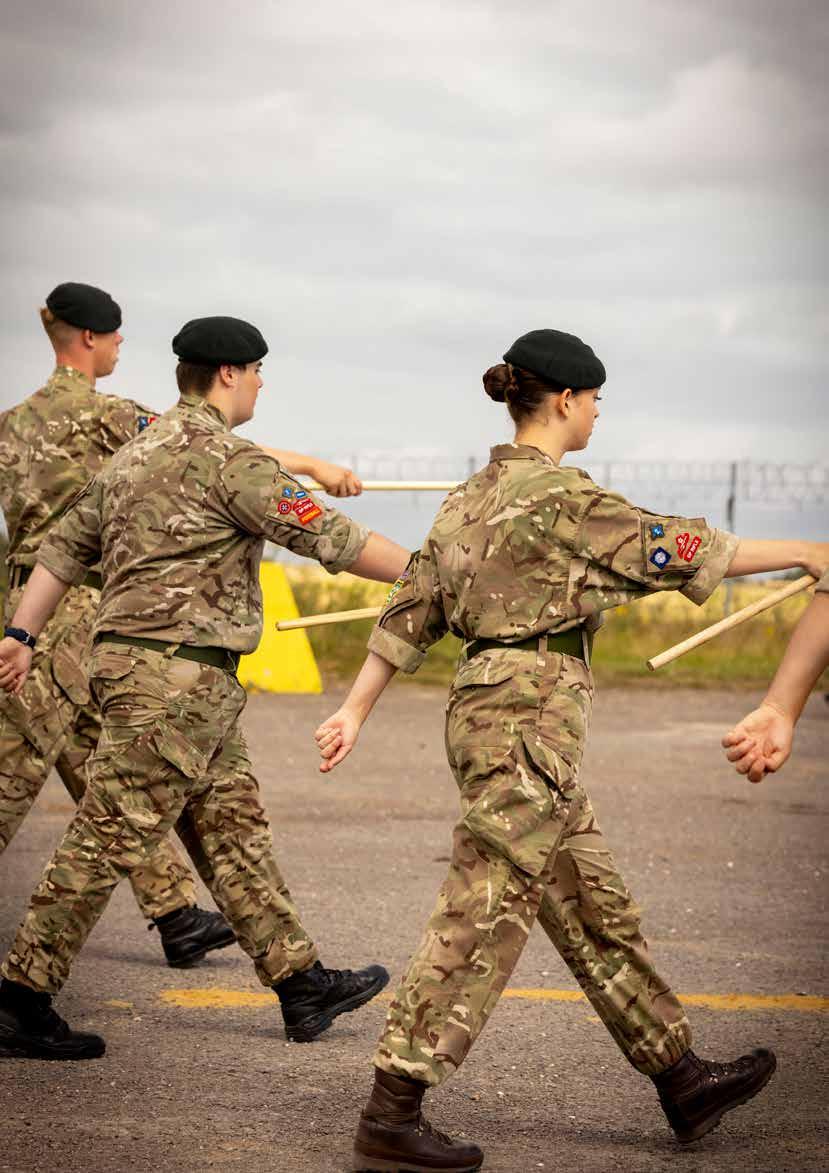
At camp, cadets polish their drill skills and learn the discipline of moving in formation as one.
Climbing, SUPs, mountain biking, canoeing, windsurfing, hiking and treetop adventures are just some of the adventurous activities cadets took part in this summer.

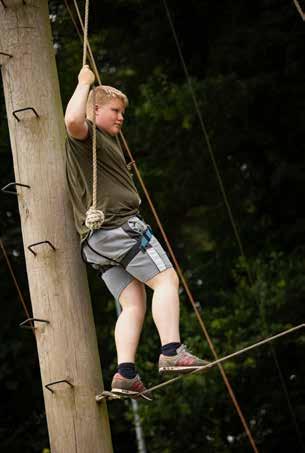
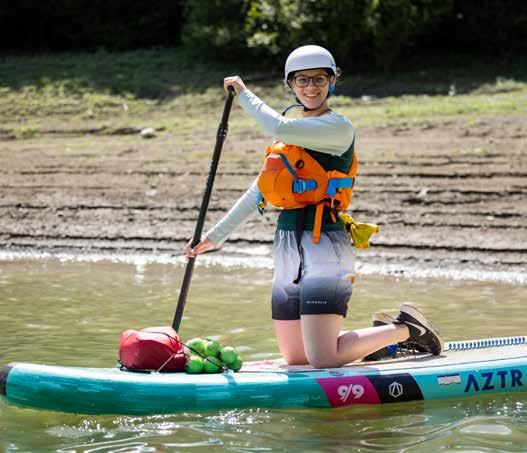


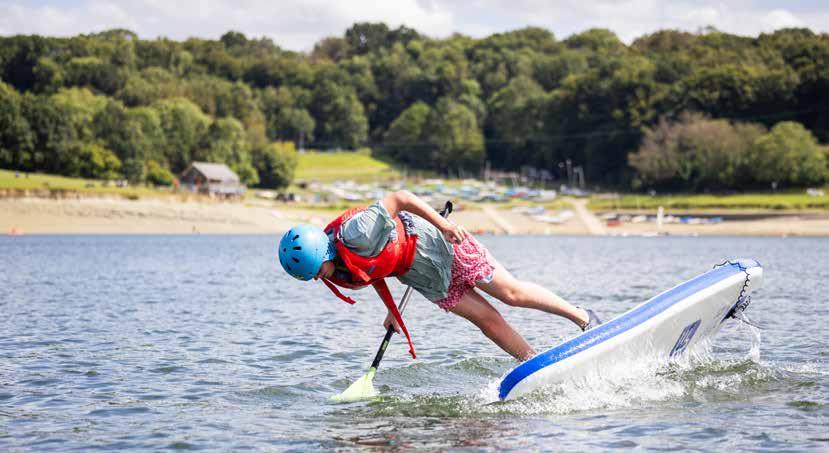




‘One of my favourite things is to see the juniors grow and, in turn, become seniors. When I leave, I know they will continue to teach their juniors. It’s a cycle and it’s so amazing. It fills me with pride.
‘Seniors at annual camps are nurturers. If junior cadets are not coping well we do everything in our power to make sure they’re okay. I’ve had experiences on camp where a young cadet has come up to me and been scared of doing their air-rifle training or going out to the area in fieldcraft. I am happy to let them know I have been there and everything will turn out fine.
‘I’m about to age out and, after finishing my plumbing course, I plan to join the Army’s Corps of Royal Engineers. After training I would definitely like to return as an adult volunteer.’
Cadets develop command skills by taking part in activities as diverse as obstacle courses, TIBUA (training in built-up areas), and communications and information systems training.
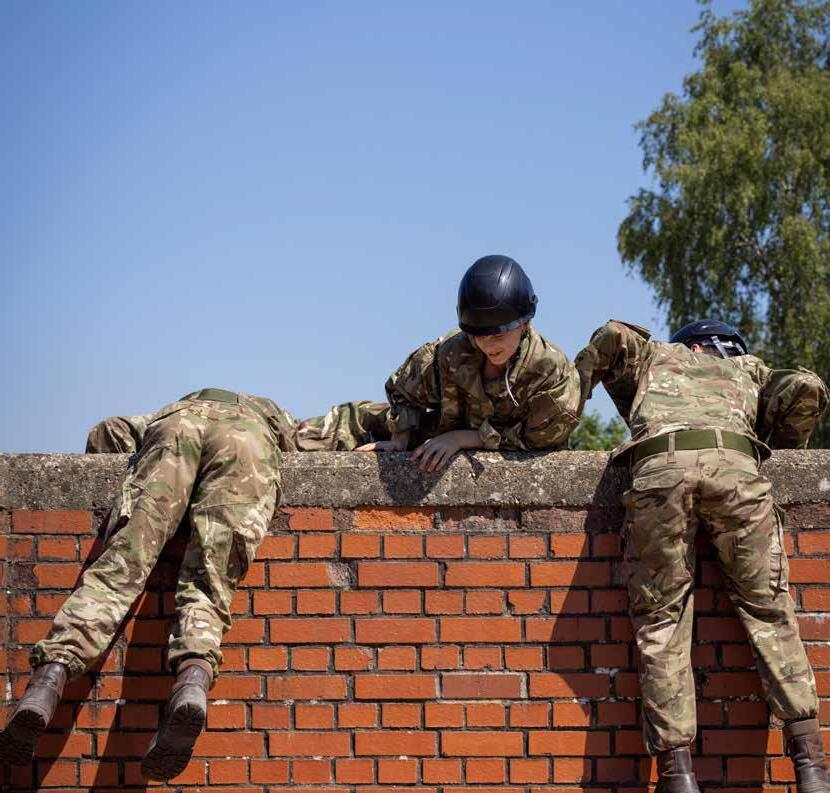
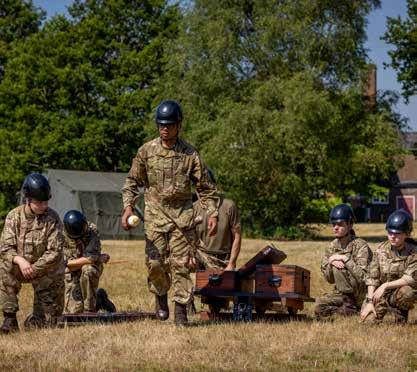


Warwickshire and West Midlands ACF cadets learn to use communication equipment
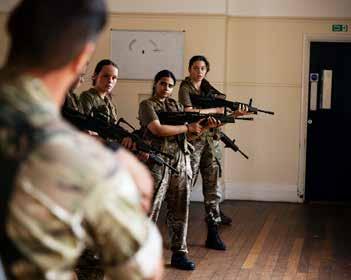
Surrey ACF cadets learn the safe and correct way to employ rifles
Warwickshire and West Midlands ACF (south Sector) cadets develop computer skills


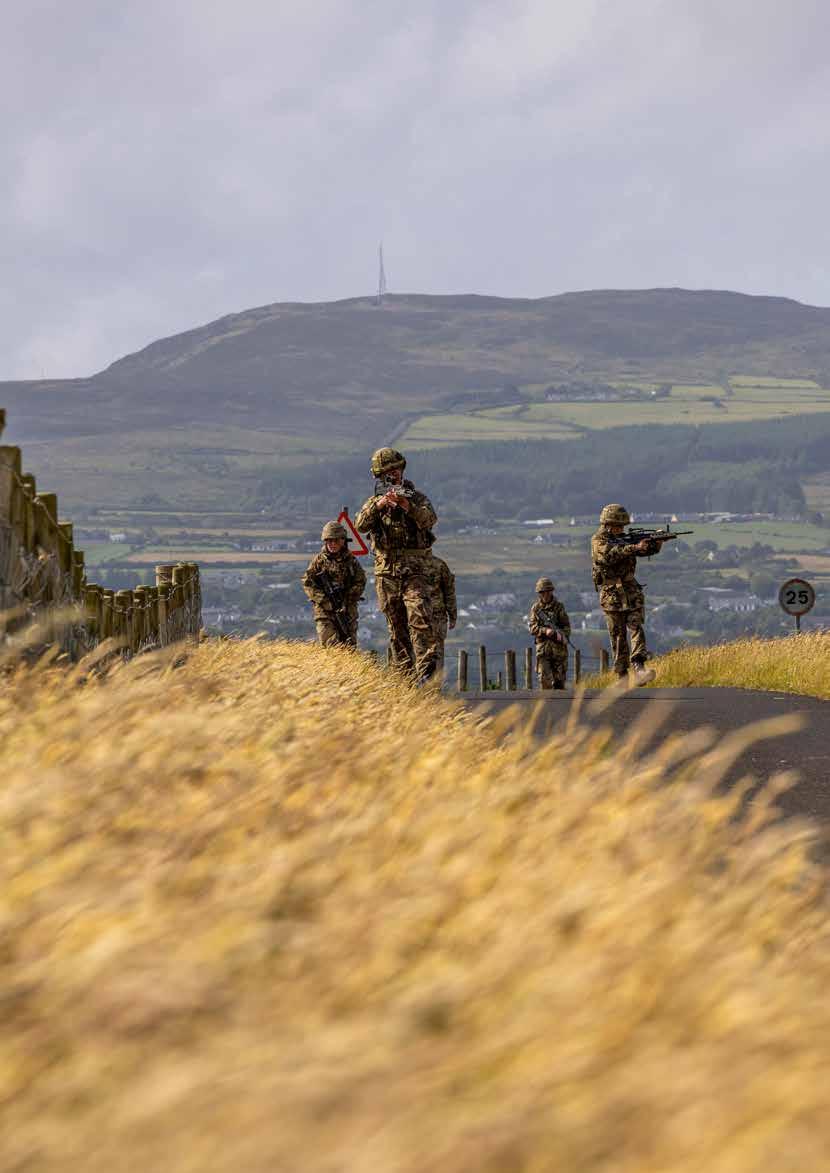
Camouflaged and ready for action, cadets undertake a variety of exciting fieldcraft activities during camp.
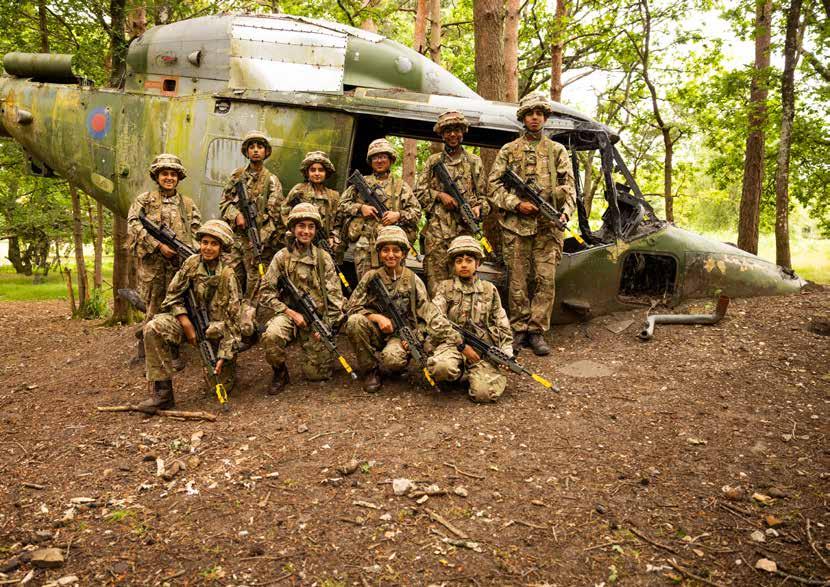

‘Throughout annual camp I learnt a lot about leadership. I was made 2IC of my section so I had the responsibility of checking everyone’s welfare. I had to check that cadets had been well fed and were hydrated and their feet were in good condition.
‘It was also my first experience of giving orders out on the field and leading cadets through section battle drills. I hope I’ll now be able to use these transferable skills in extracurricular activities, such as rugby, at school.
‘I really loved the fieldcraft; I enjoyed blank firing and getting contacted – it was fun! However, the best bit for me was sleeping out in a basha for the first time. It was brilliant sticking your head out and seeing all the stars above the canopy. I was put into a section with people I’d never met before and they were really funny so we got on well.’

Shooting on the range is one of the highlights of summer camp and where cadets develop their skills with the help of qualified instructors.

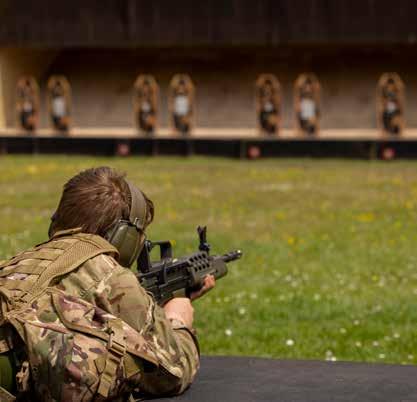


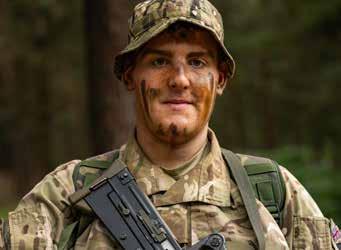
‘This was my third annual camp and I had the most awesome experience of going in a Chinook helicopter. I’d never been in a helicopter before. The fact that the Army Cadets gives you the chance to do stuff like that is amazing.
‘At this year’s annual camp, I helped cadets who were feeling worried about going out to the area during fieldcraft. The feeling of pride you get from hearing cadets say they are excited after being scared is something you don’t forget. As senior cadets, we are here to guide younger cadets through camp when they need it.
‘When I joined the Army Cadets, I was very shy and now I’m confident and open when speaking to people or being in front of a crowd. I think those skills will take me a long way in the real world. After ageing out I would like to go into the Army’s Royal Logistic Corps or Royal Military Police to gain experience, which I can bring back to the Army Cadets as a CFAV.‘
Summer camp is an opportunity for cadets to learn and practise their first aid skills with other cadets.




Archery is just one of the activities cadets get to take part in at summer camp. It helps them develop focus and self control.
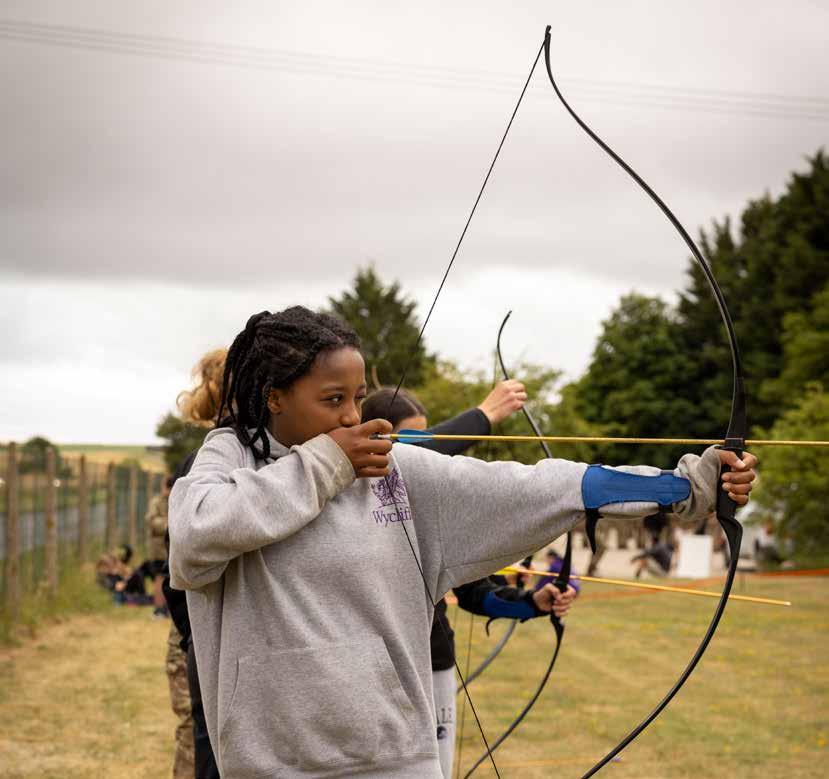

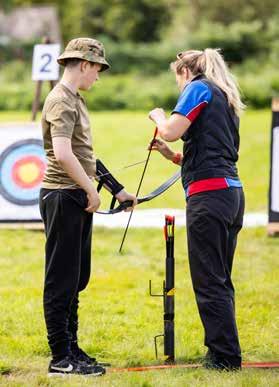
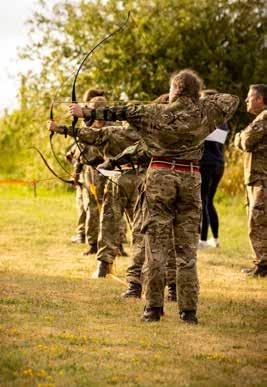
A snapshot of the many awards, qualifications and medals achieved by members of the Army Cadets.
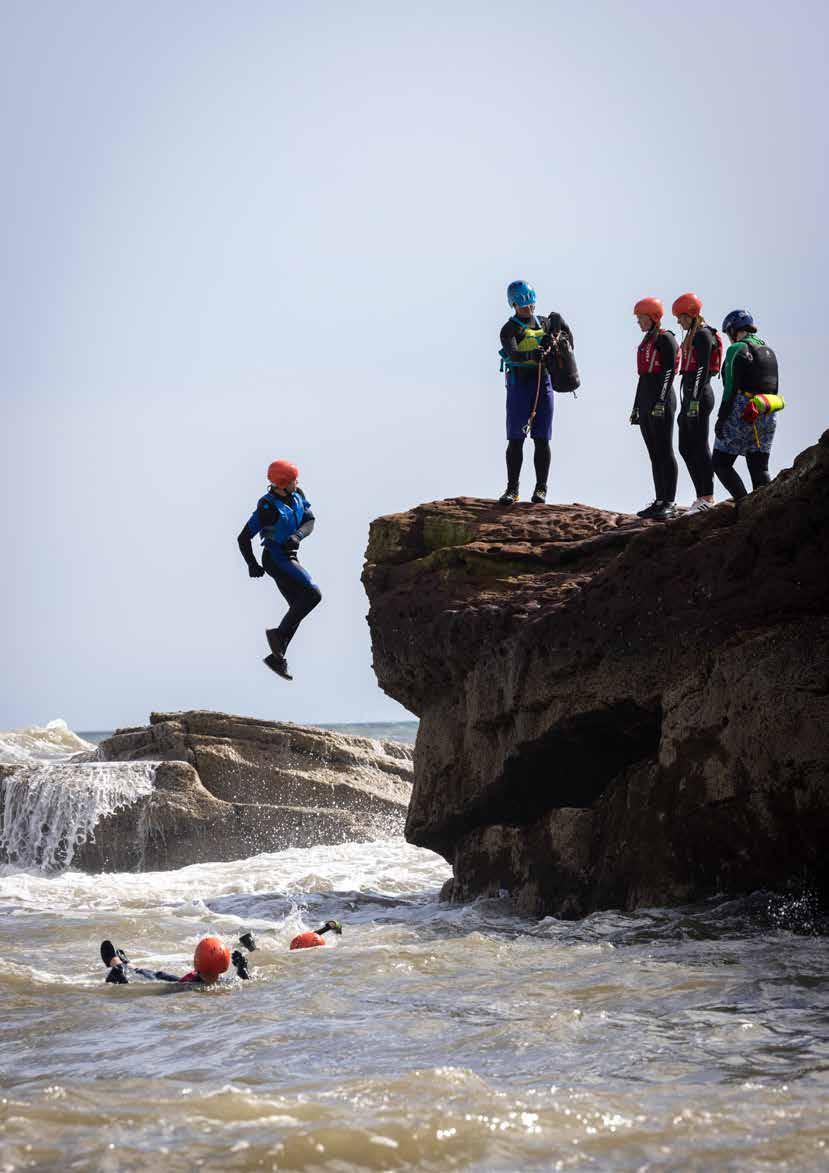
Cadet Centre for Adventurous Training (CCAT) has trained a total of 590 cadets and CFAVs between October 2023 and October 2024. These include:

The Cadet Forces Medal is awarded to commissioned officers and non-commissioned adult instructors in recognition of long and efficient service. Clasps are issued for every six additional years.
A total of 158 Cadet Force Medals were awarded between



*Awarded between September 2023 and August 2024. The Cadet Forces Warrant is an award given to adult volunteers who are promoted to the rank of sergeant major instructor (SMI). It was introduced in August 2020 to recognise the value the Ministry of Defence places on senior non-commissioned CFAVs. The warrant also acknowledges the effort and achievement required to reach this rank. The warrant is intended to be a tangible recognition for CFAVs to keep during and after their time with the cadet forces.


A snapshot of just a few of the many qualifications gained by cadets and adult volunteers between October 2023 and October 2024.
1,232
Vocational qualifications
Total number of people who gained qualifications (1,240 qualifications between them).

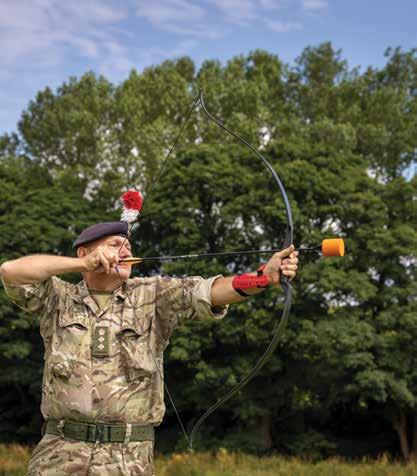
1,181 cadets 44 adults
7 achieved qualifications as a cadet and then subsequently as an adult volunteer
8 achieved more than one qualification, including one cadet
